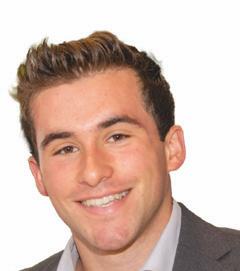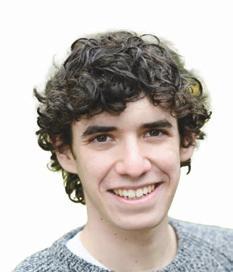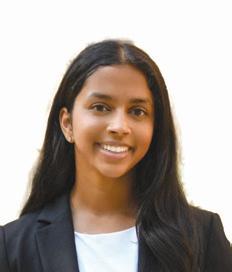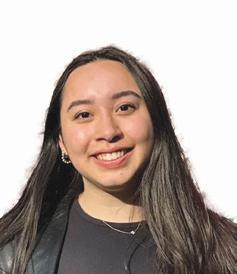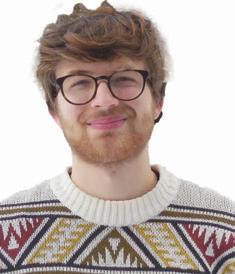The Corne¬ Daily Sun
Latest Laureate John Hopfield Ph.D. ’58, a professor emeritus at Princeton, was awarded the 2024 Nobel Prize in Physics.




Latest Laureate John Hopfield Ph.D. ’58, a professor emeritus at Princeton, was awarded the 2024 Nobel Prize in Physics.



Four students emphasized resilience following a tense year on Cornell’s campus and beyond
By MATTHEW KIVIAT Sun News Editor
Oct. 7 — One year after the Hamas-led terrorist attack on Israel, which threw college campuses across the United States into turmoil, The Sun sat down with Jewish student leaders to understand the impact Oct. 7 had on their lives.
Oct. 7 saw the worst massacre of Jewish people since the Holocaust. Hamas, which has been designated as a terrorist organization by the U.S. Department of State since 1997, killed more than 1,200 people and took more than 250 hostage.
Israel has bombarded the Gaza Strip over the last year, killing more than 41,000 Palestinians, according to the Gaza Ministry of Health. The Gaza Ministry of Health does not distinguish civilians and Hamas soldiers in its numbers.
“It’s been really challenging that the Jewish community, not just at Cornell, but all over the world, is hurting,” said Melanie Schwartz ’25, president of Cornell Hillel. “It feels like Oct. 7 wasn’t just one day — it feels never-ending and it’s been a privilege leading during this time, but it’s been very challenging, and I know that my community is hurting.”
Netanel Shapira ’25, president of Cornellians for Israel, reflected on his personal ties to the Oct. 7 attack as an Israeli student.
See RESILIENCE page 12

By GABRIEL MUÑOZ Sun City Editor
Oct. 5 — Vice President of University Relations Joel Malina said the University would allow a Ku Klux Klan representative on campus if invited by a faculty member or student group, after being asked by Cornell Hillel’s Executive Director Rabbi Ari Weiss on a private Zoom call with Jewish parents on Monday evening.
Concerned about the implications of the statement on minority students’ safety, Black Students United is now calling for Malina’s removal from office, with about 180 students rallying from William Straight Hall to Day Hall at noon on Friday.
“Fire Joel Malina!” and “Hey! Hey! Ho! Ho! Joel Malina has got to go,” protesters chanted as they marched to Day Hall. Once there, they taped a sheet with their demands to the entrance of the building.
In addition to firing Malina, BSU urged the University to reverse the suspension of interna-
tional graduate student Momodou Taal, bargain with Cornell Graduate Students United over Taal’s working conditions, revise the Interim Expressive Activity Policy and decrease police presence and surveillance at protests.
BSU, which encompasses dozens of cultural, mentorship, performance, professional and Greek organizations, argued Malina’s remarks endanger students.
In the days leading up to the rally, BSU held an emergency meeting and community action night to advocate for Malina’s firing.
“All students of color at Cornell are under attack by administration. We do not feel safe, seen or heard. Help amplify our voices, we are stronger together,” an Instagram post advertising the community action night read.
Other campus organizations including La Asociación Latina, Native American and Indigenous Students at Cornell, the South Asian Council and Haven also condemned Malina’s remarks through social media.
By MAX TROIANO and ISABELLA HANSON Sun Contributor and Sun Senior Writer
Oct. 8 — A crowd of about 500 attended a vigil led by Cornell Hillel at Ho Plaza to mourn, remember and pray for Israeli hostages on Monday night, the one-year anniversary of the Oct. 7 Hamas-led attack on Israel.
There was a somber mood among the Cornell students and Ithaca community members gathered there, some carrying Israeli and American flags and many holding candles. Hillel President Melanie Schwartz ’25 and Cornell Chabad Co-President Abbey Charlamb ’25 gave opening remarks before leading a moment of silence.
“We … pray for the safe return of every single one of the remaining hostages, to send comfort to those grieving loved ones and to send courage and strength to our brothers and sisters in the IDF defending the State of Israel,” Charlamb said.
Prof. Yuval Grossman, physics, thanked Cornell for support that went beyond the Jewish community after the events of October 7.
“Working for peace is the only way forward,” said Grossman, who is Israeli-American.
The crowd stood silent as the names of the 101 hostages still in Gaza were read aloud. Some vigil-goers broke into tears as a TV played a video of Rachel Goldberg-Polin’s eulogy for her son Hersh, a hostage killed by Hamas.
Vice President for Student and Campus Life Ryan Lombardi, Democratic candidate for the House of Representatives Josh Riley and Republican candidate for the New York State Senate Mike Sigler were in attendance.
“I’m here to support the community as people are coming together and mourning,” Riley said.
“It was beautiful,” Sigler said of the Ho Plaza vigil. “I loved the reading of the names. I think that’s important.”
A simultaneous vigil hosted by Cornell’s chapter of Students for Justice in Palestine and Jewish Voice for Peace
outside Bailey Hall drew about 50 mourners. Hasham Khan ’26, a speaker for SJP, opened the event.
“I do know that people on this campus realize that there is a deep-rooted injustice going on in the world, and we are directly contributing to it,” Khan said. “When I use my voice to say, ‘maybe we should not be contributing to this genocide,’ I was told … that it’s not true. I was told that this is antisemitic. I was told that I am supporting terrorism by supporting the people of Palestine. And I just did not understand … why people’s right to liberty and self-determination was so controversial.”
To continue reading this article, please visit www.cornellsun.com.
Max Troiano can be reached at mt857@cornell.edu and Isabella Hanson can be reached at ihanson@cornellsun.
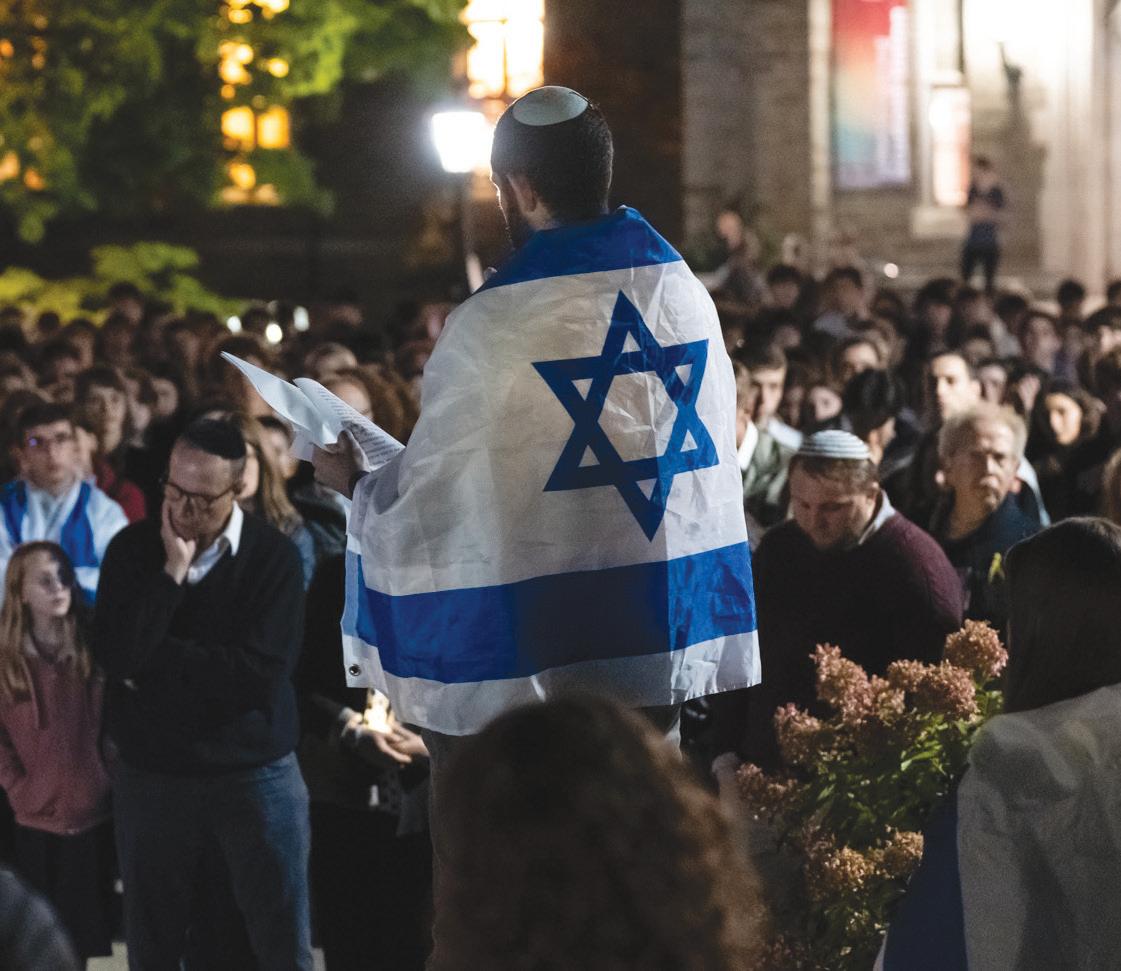
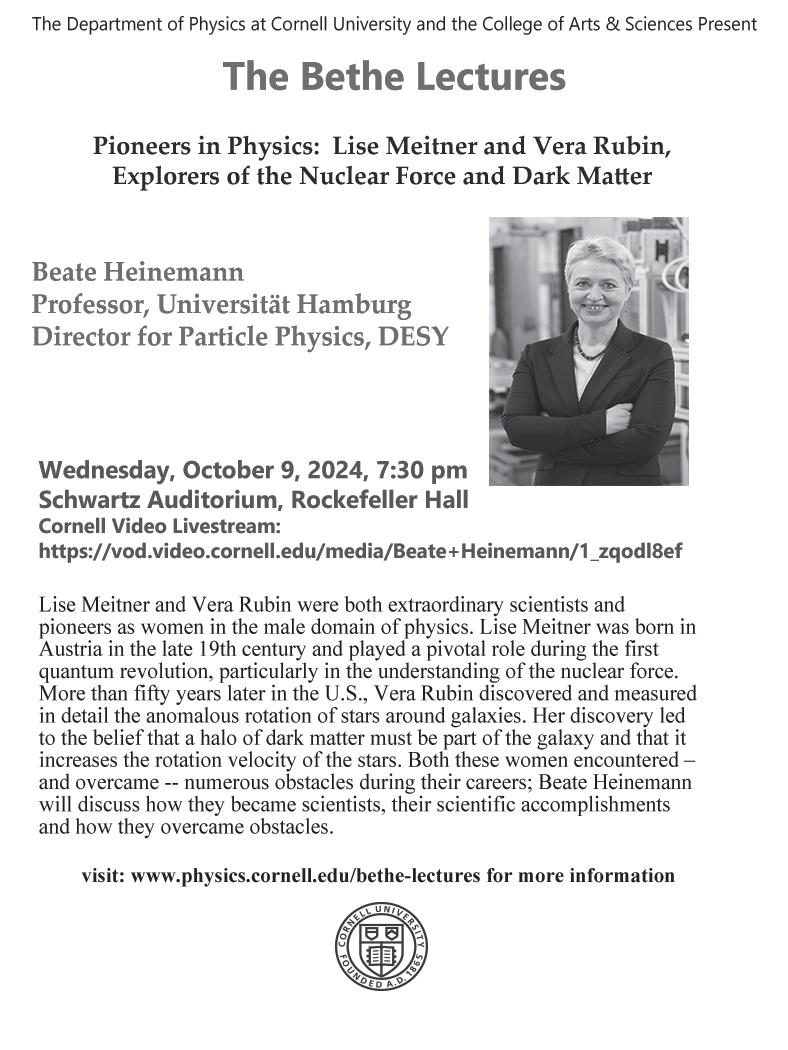
Today
Introduction to JupyterLab for Python/R 9 a.m. - 10 a.m., Virtual Event
National Coming Out Day With the LGBT Resource Center 11 a.m. - 2 p.m., Ho Plaza
Applied Physics Graduate Society Coffee Hour 1 p.m. - 2 p.m., 243 Clark Hall
Jiang Fellows Information Session 4 p.m. - 5 p.m., Virtual Event
Talk and Q&A With Justice Hector LaSalle 4:30 p.m. - 5:30 p.m., 106 Morrill Hall
Professional Directions: Q&A With Filmmaker Will Gluck 4:30 p.m. - 6 p.m., Schwartz Center for the Performing Arts Inside Elections 5 p.m. - 6:30 p.m., 145 McGraw Hall Reforming Criminal Justice: A Christian Proposal 12:15 p.m. - 1:15 p.m., Myron Taylor Hall

Tomorrow
Tis past week, the Cornell and Ithaca communities came together to take a stand for and honor the causes and conficts they are most passionate about
By SUN PHOTOGRAPHY DEPARTMENT
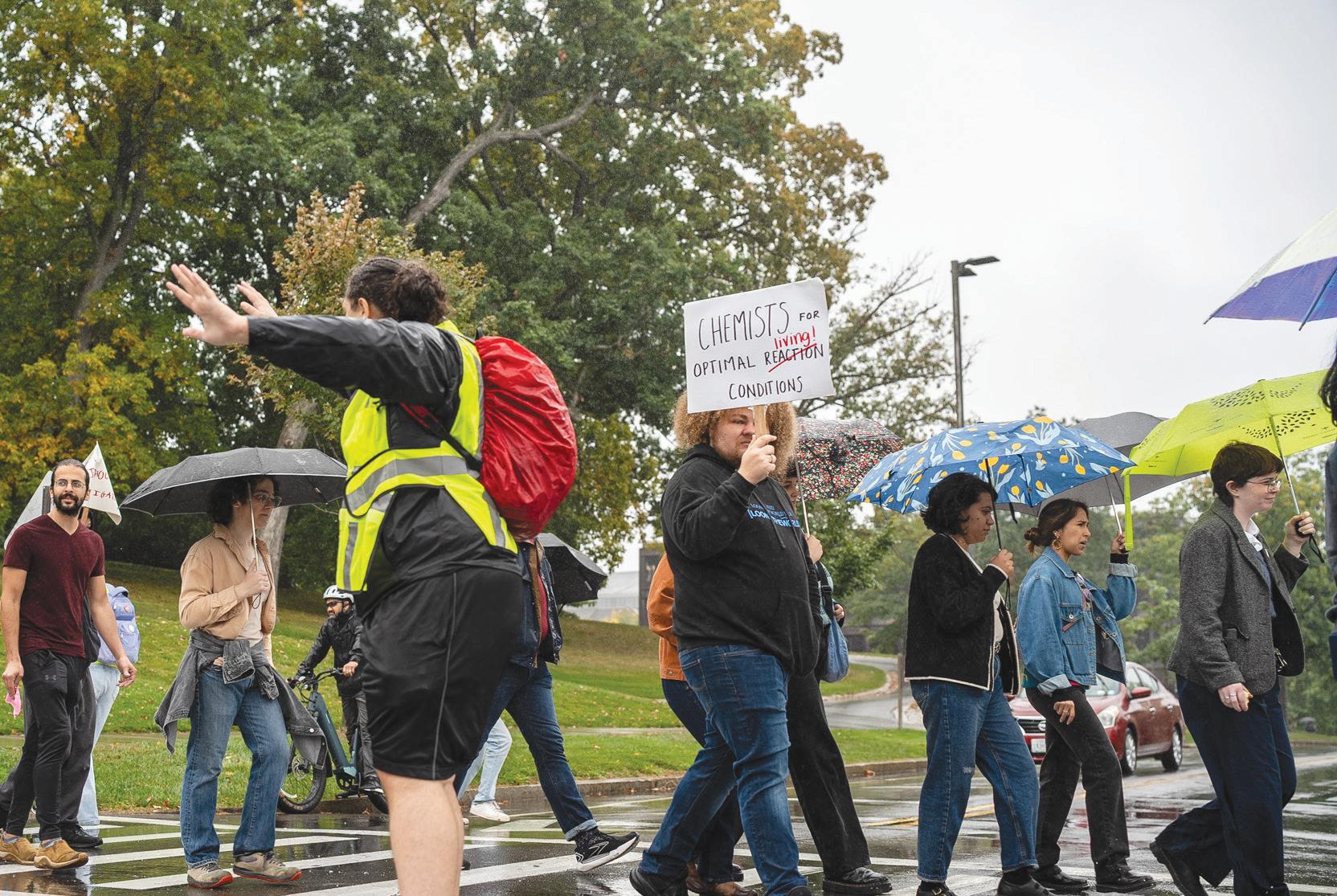
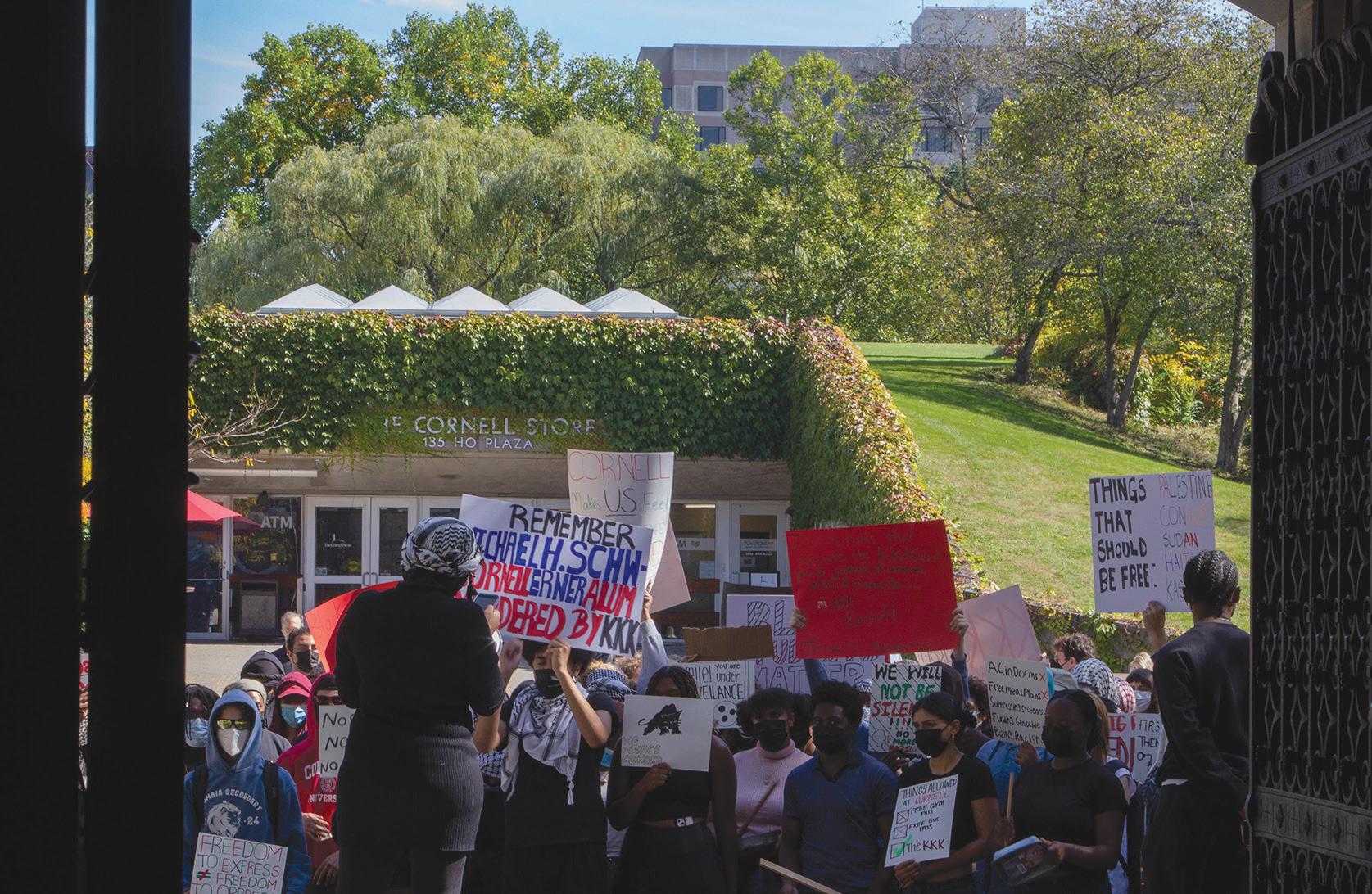
Following controversial remarks from Joel Malina regarding the allowance of a KKK representative on campus, BSU organized a protest outside of Willard Straight Hall on Friday, Oct. 4.
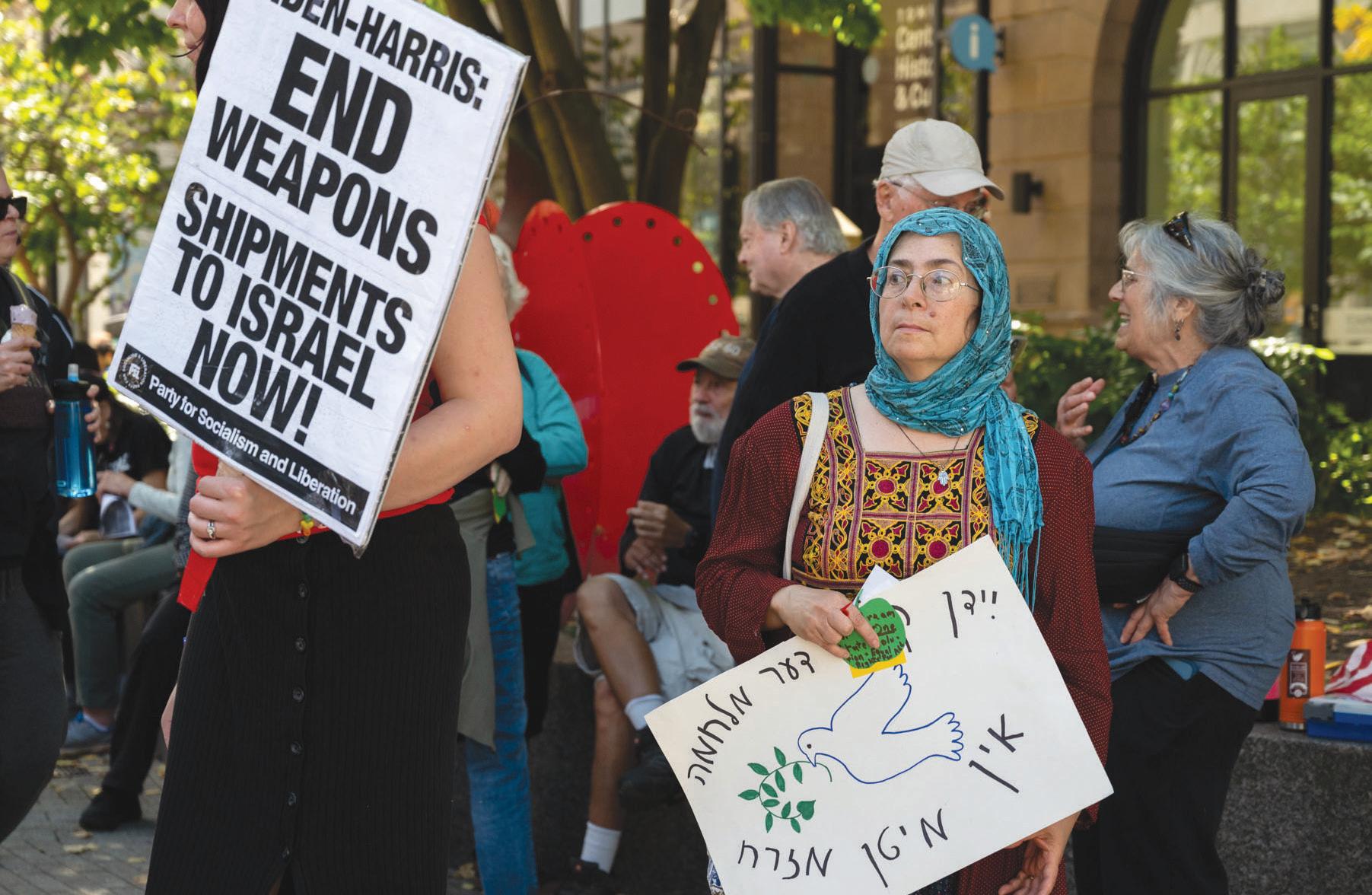
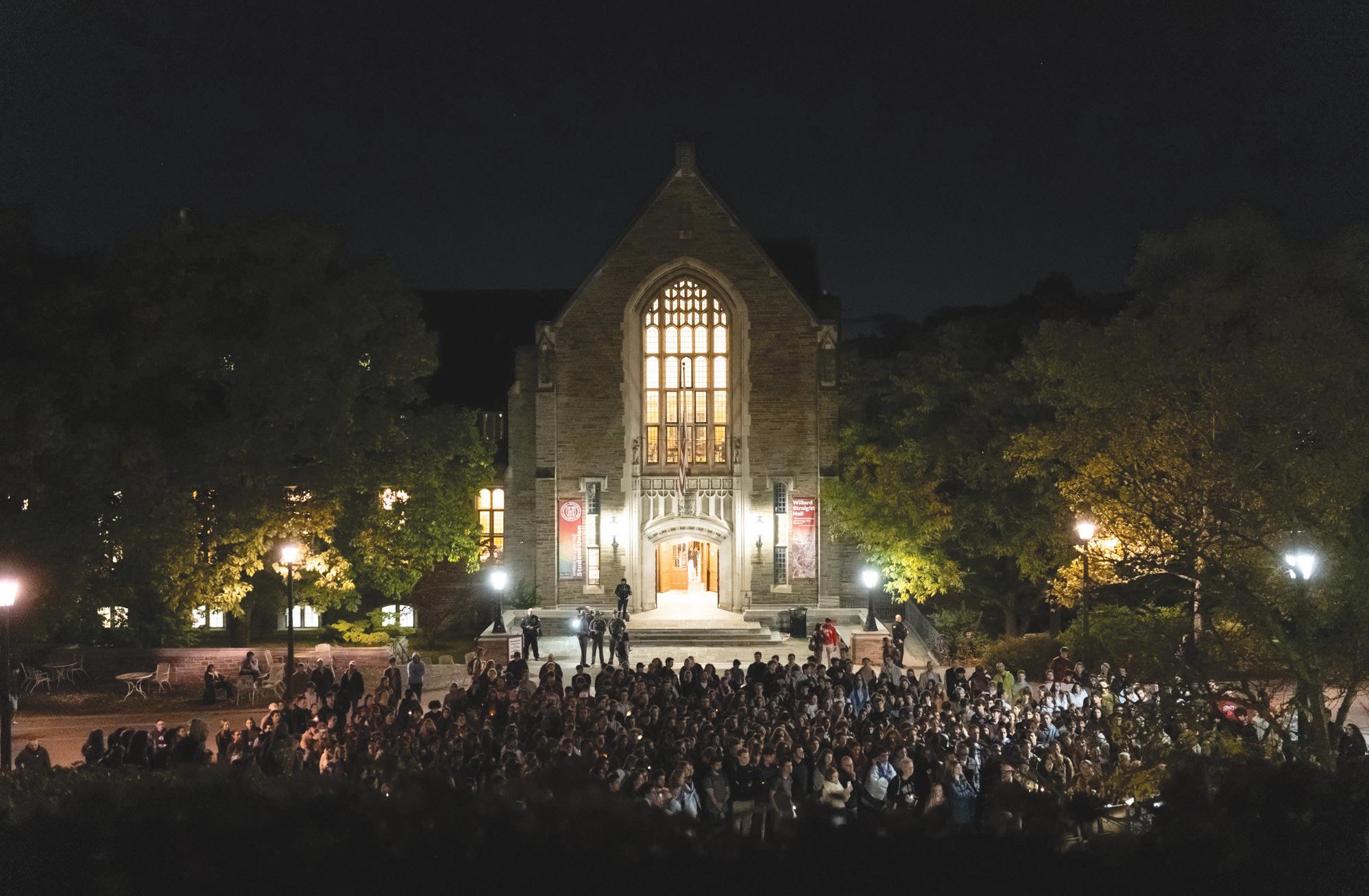
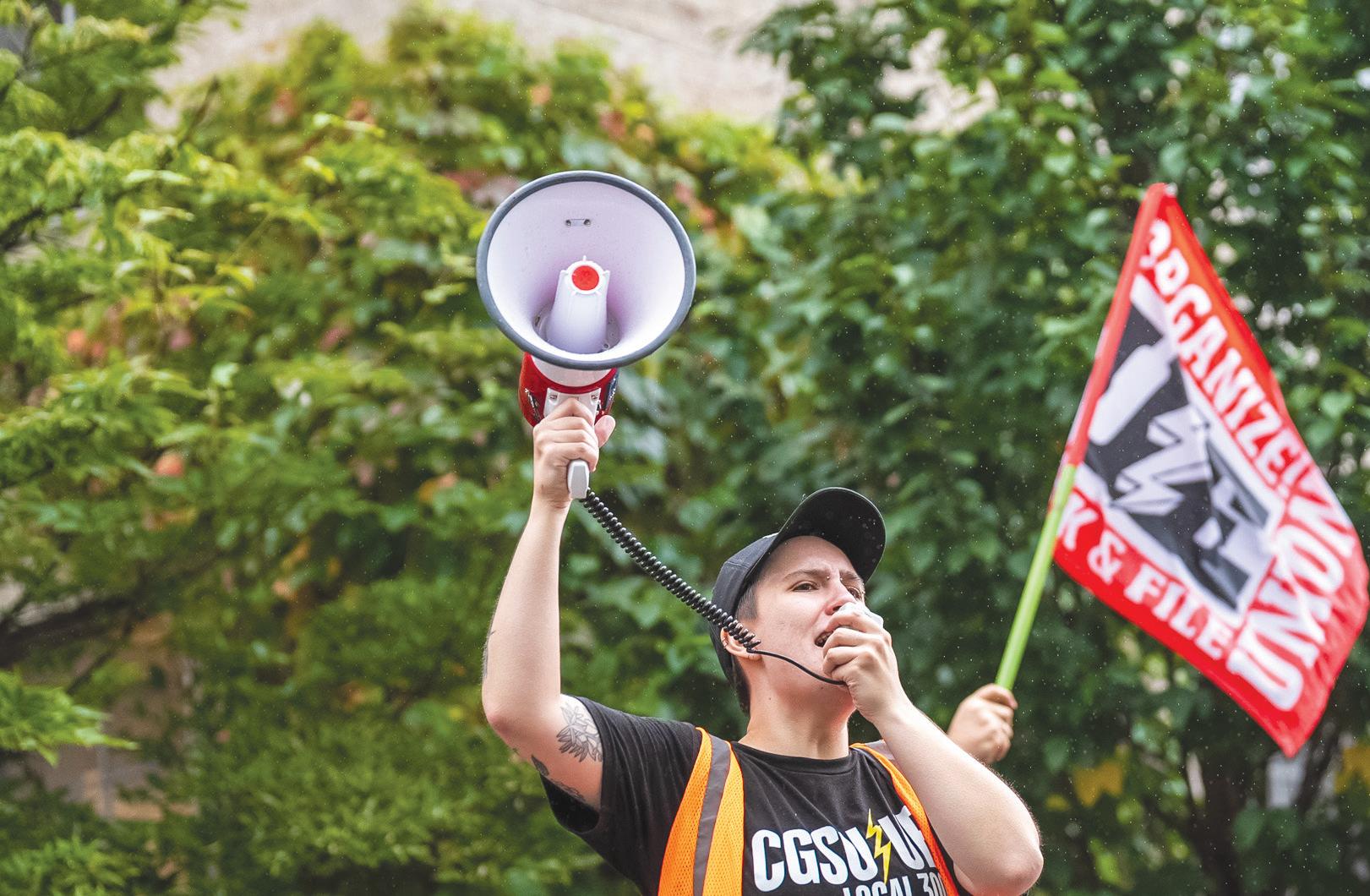
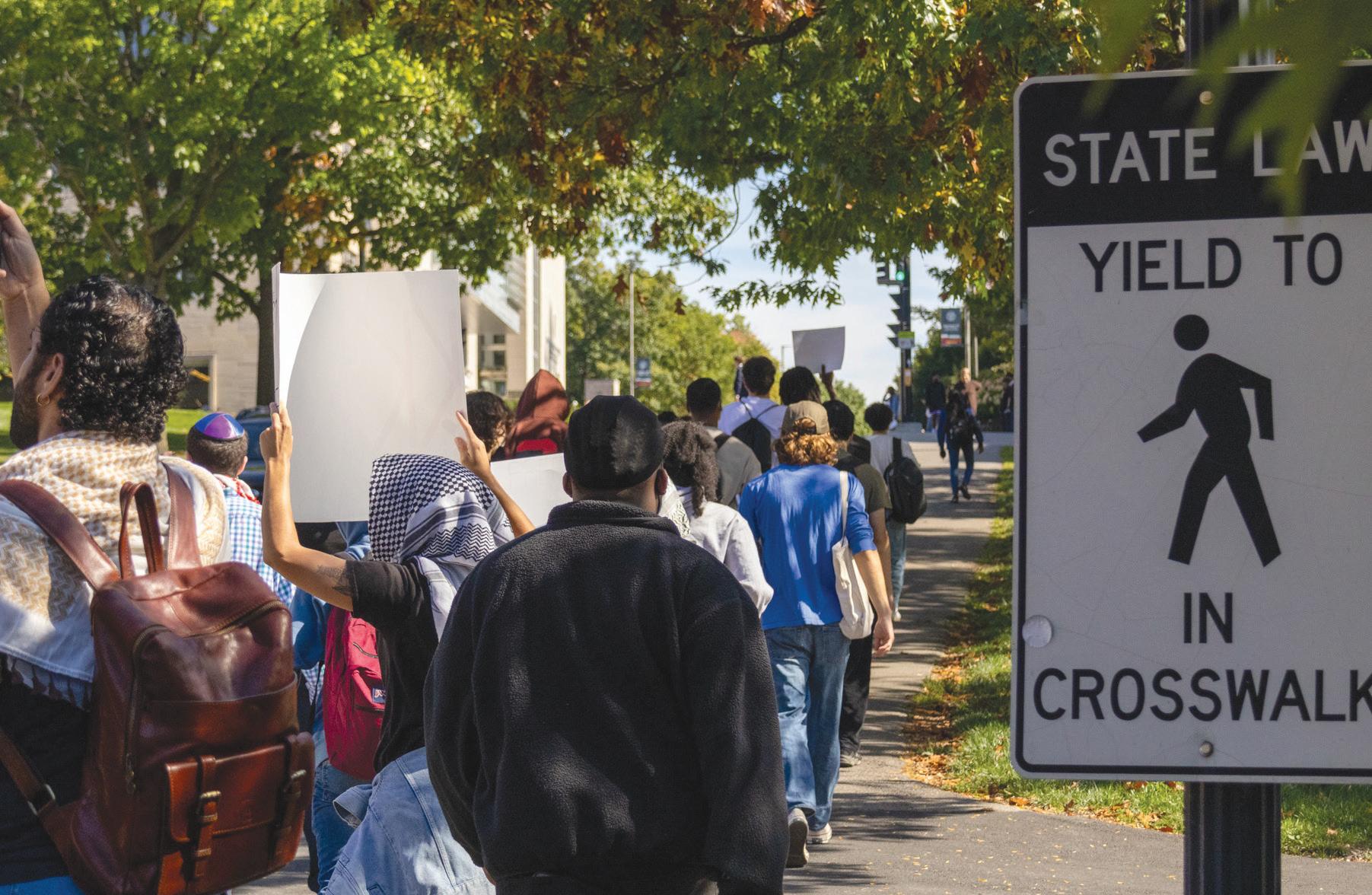
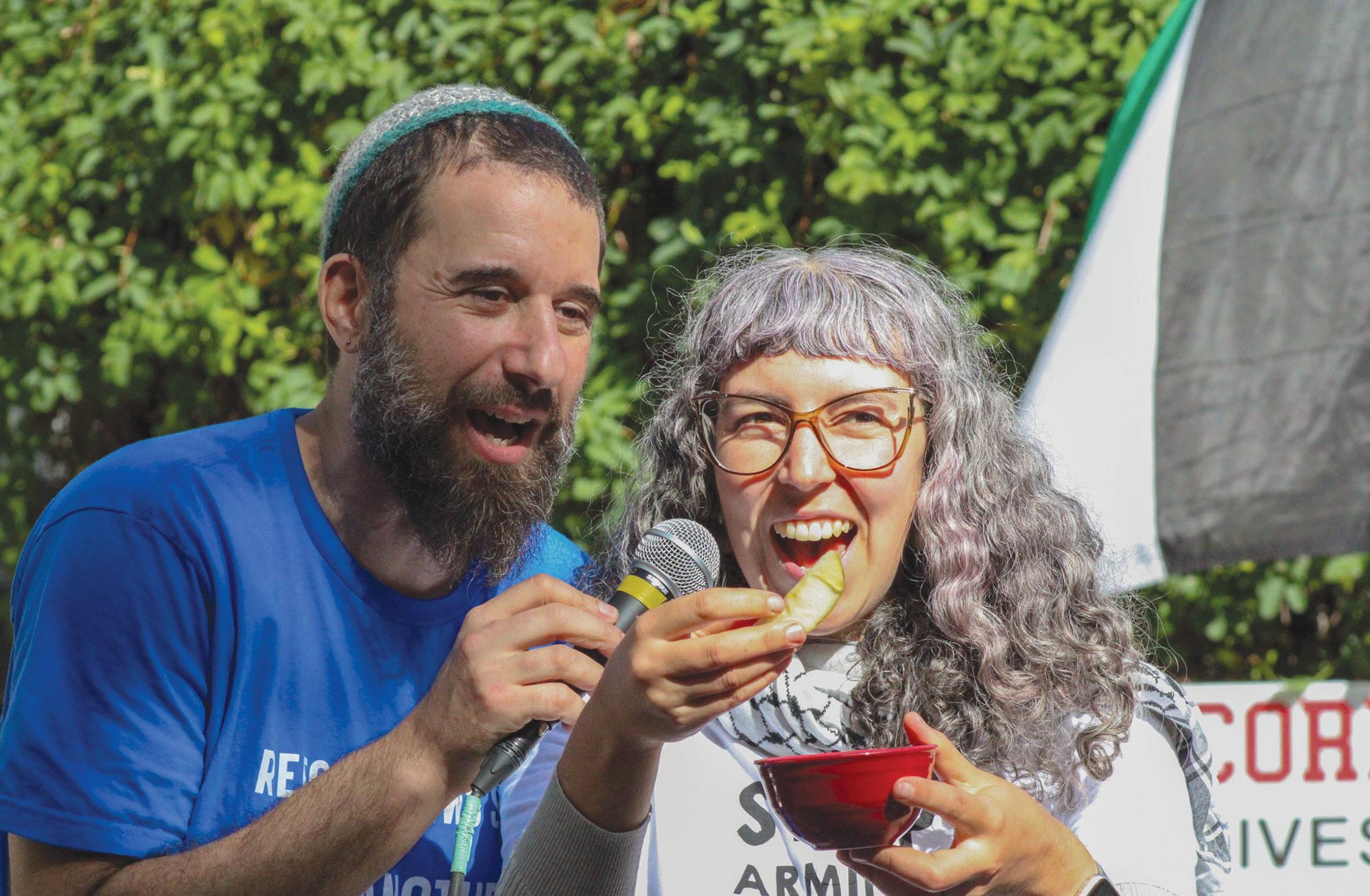
the
of the
attendees of all
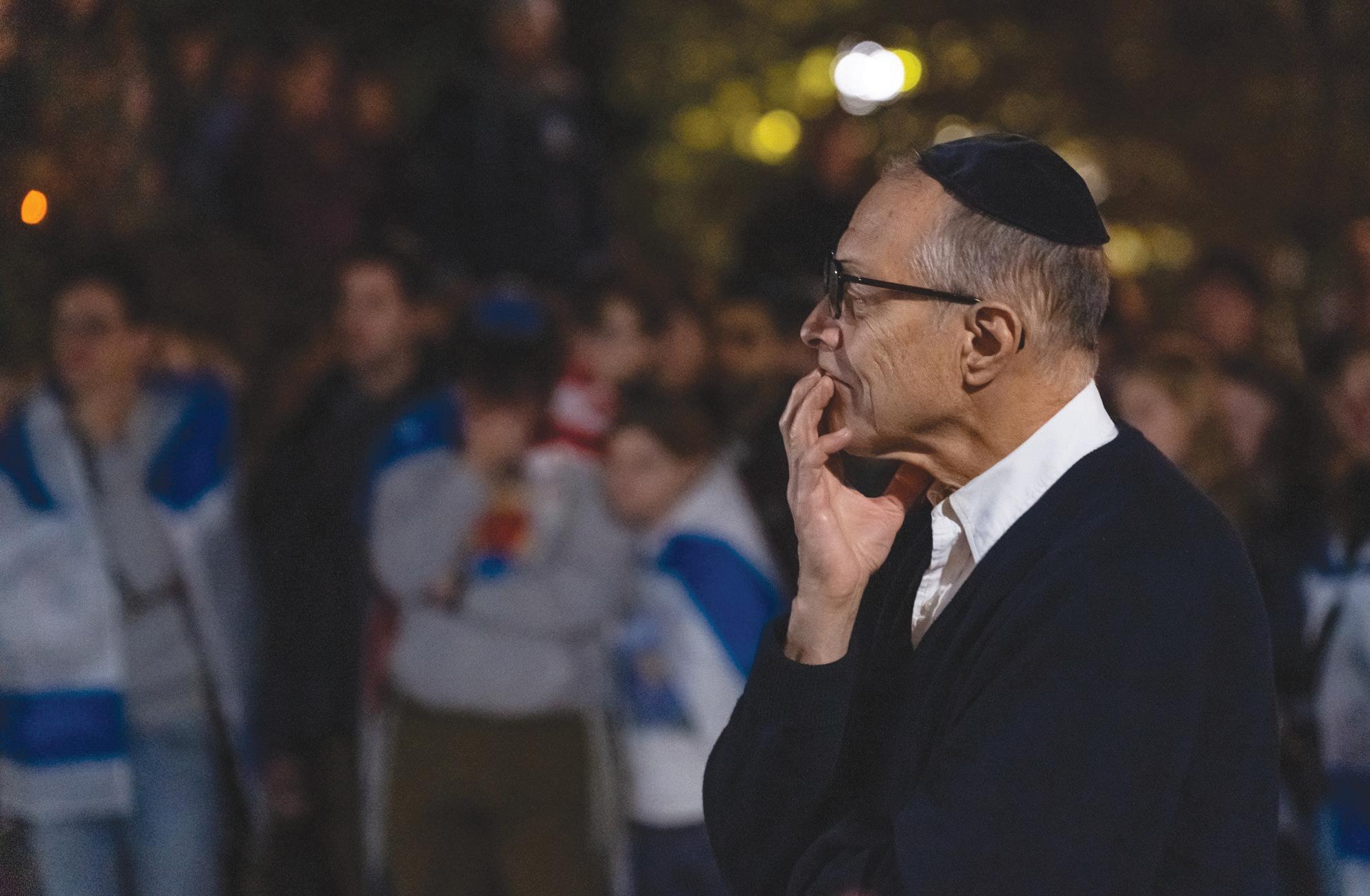
By GABRIEL
Oct. 3 — Approximately 180 Cornell Graduate Students United members and supporters gathered in front of Bailey Hall at noon on Wednesday to protest for the University to bargain with CGSU over international graduate student Momodou Taal’s suspension.
CGSU — the graduate student union established in November 2023 — is demanding the University bargain Taal’s suspension under a Memorandum of
Agreement reached in July 2024. CGSU successfully bargained for the MOA following advocating for Taal and Bianca Waked grad who were temporarily suspended for organizing a pro-Palestine encampment last spring.
The agreement gives CGSU the right to bargain over the effects of academic discipline of graduate students as long as it affects their working conditions.
The union is arguing Taal’s suspension is included within the terms of the MOA since he was an instructor for “What is Blackness? Race and Processes of Racialization,” a First-Year Writing Seminar under
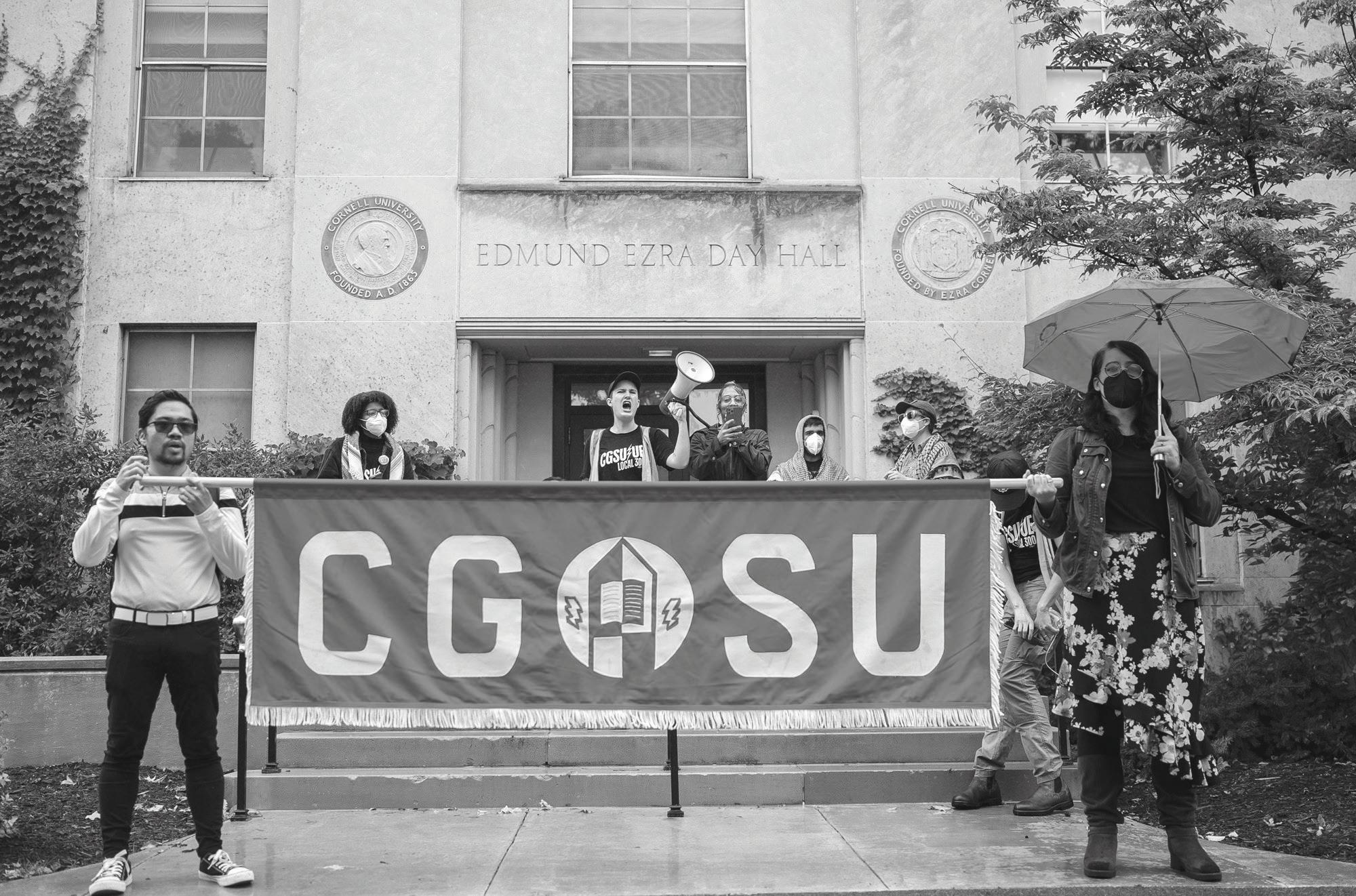
the Africana Studies and Research Center.
The University suspended Taal for his involvement in a career fair disruption in Statler Hall on Sept. 18 attended by defense contractors L3Harris and Boeing. If Taal is withdrawn from the University, he will be in violation of his F-1 visa status, likely leading to his deportation.
According to a report by Cornell University Police Department Lieutenant Scott Grantz ’99, Taal and other protesters entered Statler Hall after explicitly being told that they were not permitted to do so by officers and participated in “unreasonably loud” chants.
Interim University President Michael Kotlikoff claimed protesters pushed through police at the ground-floor and second-floor entrances.
Sun reporters on the scene did not witness violence against law enforcement.
According to BSU leadership’s recollection of a Monday meeting with Interim President Michael Kotlikoff and Vice President of Student and Campus Life Ryan Lombardi, the administrators said they are using interim measures instead of the MOA to manage the case since they are “prioritizing the safety and the health of the community.”
CGSU is among several campus organizations arguing for the University to rescind the suspension.
Jawuanna McAllister grad, a member of the CGSU-UE Bargaining Committee, told The Sun the union hoped the University would respond to their request to bargain.
“We know that Cornell has a pattern of unjustly disciplining workers without due process,” McAllister said. “And so what we need is for Cornell to, right now, hold up their fair end of the bargain with this Memorandum of Agreement, and actually bargain with us over the things that affect our employment.”
Oct. 6 — As the one-year anniversary of the start of the Israel-Hamas war approaches, approximately 100 students and community members gathered for the International Day of Action at the Bernie Milton Pavilion in the Ithaca Commons on Saturday, Oct. 5.
This event is part of the larger International Day of Action movement created by Shut it Down for Palestine —— an international fundraising movement created for Gaza. Pro-Palestine organizations across North America and Europe have united to mark the day in support of the Palestinian cause.
The event aimed to foster solidarity between multi-faith organizations and raise awareness about Palestinian liberation. It was co-hosted by six organizations — Ithaca Committee for Justice in Palestine – Jews for Mutual Liberation, Jewish Voice for Peace at Cornell, Students for Justice in Palestine at Cornell, the Coalition for Mutual Liberation, Ithaca Democratic Socialists of America and the Party for Socialism and Liberation in the Finger Lakes.
According to Yihun Stith ’26, a spokesperson for CML, the International Day of Action gave the Ithaca community an opportunity to reflect on the past year.
“The International Day of Action is an event for all of us to come together to mourn, to celebrate, to kind of show the community that has been growing since last year, … and I think it’s a real show of power how the community has grown,” Stith said.
Momodou Taal, a pro-Palestine international graduate student whose second suspension puts him at risk of being deported if his second and final appeal is denied, condemned the U.S. government’s financial and military support to Israel.
After being suspended in the spring for helping organize the pro-Palestine encampment on the Arts Quad, Taal’s was suspended a second time after shutting down a career fair attended by defense contractors L3Harris and Boeing. His suspension currently bars him from campus.
Taal criticized President Joe Biden and Vice President Kamala Harris’ “abysmal job” working towards a ceasefire, discussing a 26 billion dollar bill passed by the House to provide financial support to Israel for its defense and security needs and Biden’s approval of over 100 individual weapons transfers since Oct. 7, 2023, to the Israeli military.
“This is America’s war on the Palestinian people with all the death and destruction. We still want to despair,” Taal said. “It is time that we lose our fear, being proud of standing on the right side of history.”
Michael Margolin, a Jewish Educator in a local synagogue and a member of JML and Reform Jews For Justice, spoke about the shared humanity of all people affected by the Israel-Hamas conflict, calling for an end to U.S. military support for Israel.
“I believe choosing life and choosing the mutual humanity of Palestinians and Israelis and Lebanese people and Iranian folks and Syrian folks and Yemeni folks in that region means that the U.S. has to stop funding and providing weapons to Israel,” Margolin
said. “We need an international arms embargo on Israel so that Israel stops destroying the region and provoking a larger war.”
Multi-faith organizers led prayers and rituals at the event, with Ithaca CJP’s Jews for Mutual Liberation group sharing a Tashlich ritual, a Jewish New Year ceremony to cast off the sins of the past year. As Rosh Hashanah had just concluded, the Tashlich ritual held special significance, allowing participants to reflect on renewal and liberation at a time of both personal and communal introspection.
Margolin explained that people will participate in Tashlich by writing messages on a Post-it based on the prompt “where we will cast off the things that are holding us back from engaging in mutual liberation in the water.”
Participants cast off these messages by throwing the Post-its in the water, which was represented by a bowl of water from Cayuga Lake. Afterward, people could write their hopes and messages on another sticky note and pin them to a tree drawn onto a canvas sheet.
Margolin discussed the importance of making conscious, compassionate choices during this crucial time.
“One of the lines that we’re going to say on the high holidays is that, it comes from the Torah, that God put in front of the people, a choice — blessing or curse, life or death,” Margolin said. “And the encouragement is to choose life.”
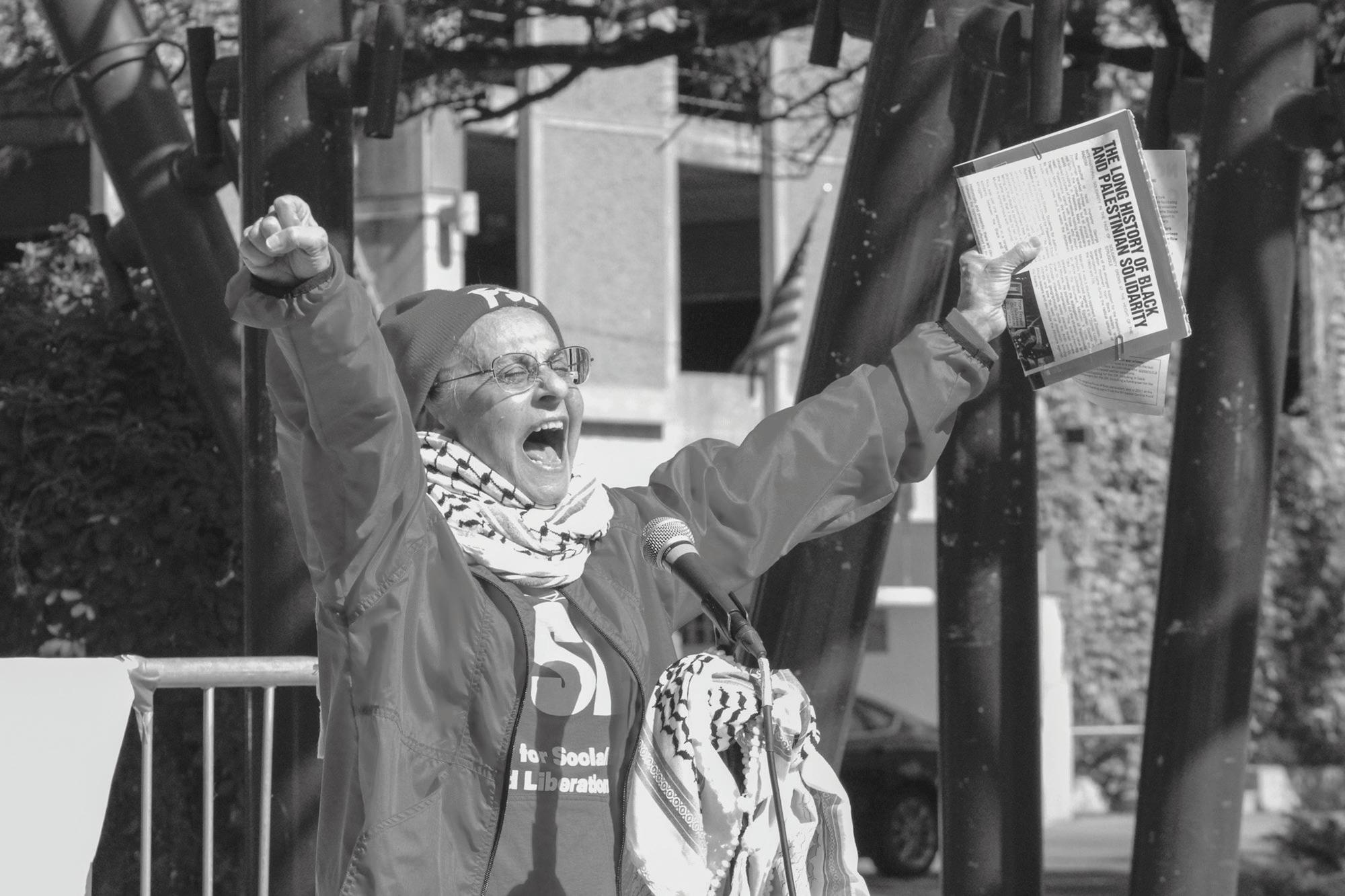
By JONATHAN BRAND Sun Senior Writer
Oct. 7 — Incumbent State Senator Lea Webb (D-N.Y.) will face off against Republican Mike Sigler in November to maintain her position in New York’s 52nd district.
Born and raised in Binghamton, Webb has been a lifelong resident of the Southern Tier. After graduating from a public high school, Webb became a first-generation student of SUNY Broome Community College and later Binghamton University.
After graduation, Webb worked as an educator for Binghamton University. There, she developed diversity and inclusion training-based programs for students, faculty and staff.
Webb was eventually elected
into Binghamton’s City Council in 2007, making her the first Black person to have served on the council. During her two-term run, which ended in 2015, Webb worked to strengthen her community by redeveloping blighted properties into homes for the community.
Webb also passed legislation supporting equal pay for women, creating a city-based human rights commission, establishing a citywide climate action plan and supporting small business development and job creation.
In 2022, Lea Webb was elected to represent the then-newly redrawn 52nd State District. Once she was sworn in in January 2023, she officially became part of a historic class of 18 incoming Democratic senators made up entirely of women for the first time
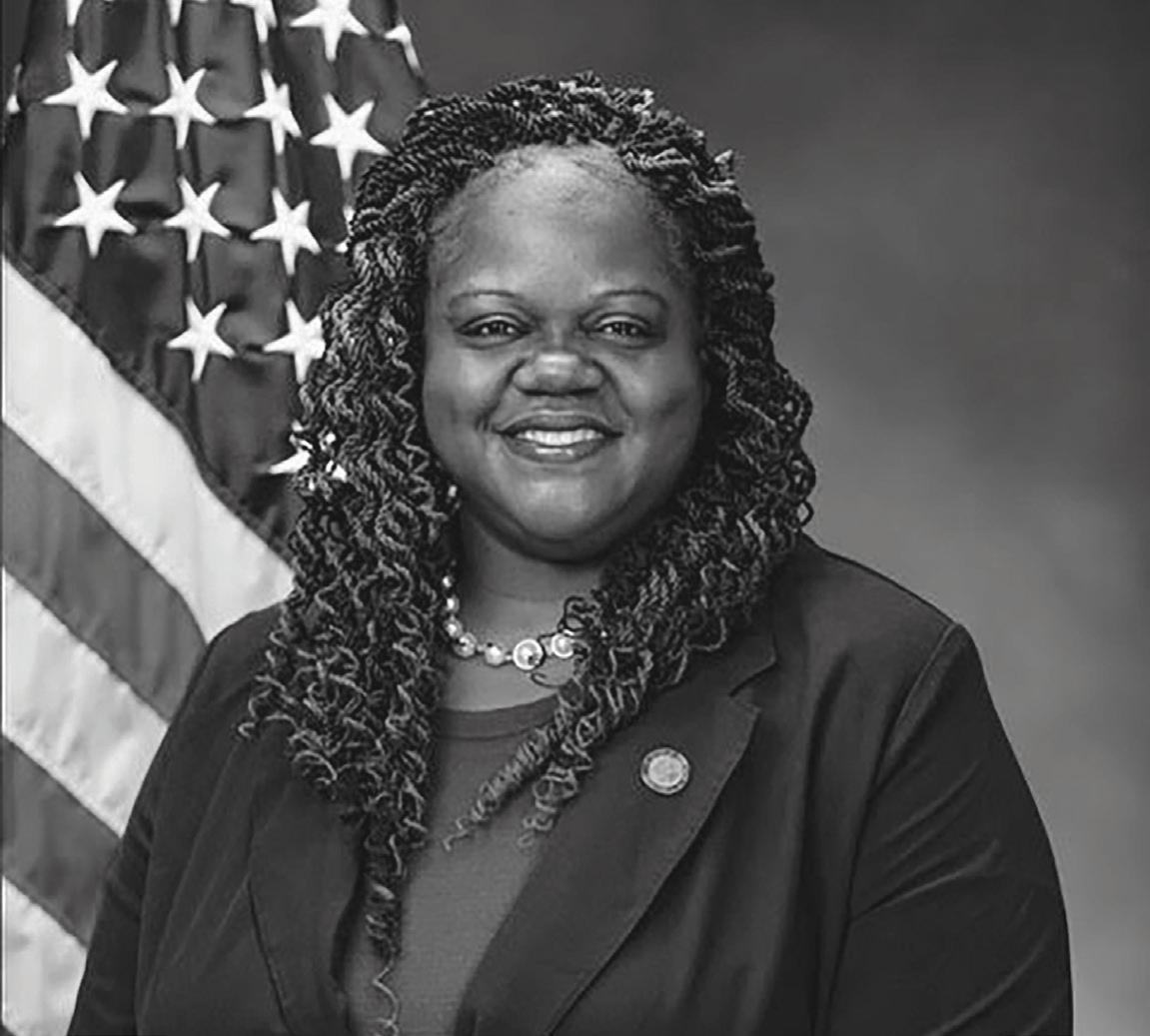
in the 245-year history of the New York State Senate.
During her campaign for reelection to the State Senate, Webb has been dedicated to tackling a variety of issues relevant to both New York and across the nation.
“When reelected to a second term in the N.Y. Senate, I will continue to fight to improve equitable access to resources for working families,” Webb said. “I will ensure women’s reproductive rights are always protected in New York.”
Tackling issues regarding women’s reproductive rights has always been a priority for Webb, who plans on continuing the fight if reelected.
“I was elected in a post-Roe v. Wade world, where reproductive rights and freedoms that had long been settled as a civil right, continue to come under attack,” Webb said. “There are consistent efforts to roll back this important healthcare right, including legislative actions to criminalize doctors providing care to their patients and more. I ran with the resolve that if the Supreme Court wouldn’t protect a woman’s right to choose, I would as a state senator.”
This past year, Webb sponsored a unanimously passed a maternal health care bill, which requires that the Department of Health summons a workgroup to study and evaluate the development of various reproductive developments and issues.
Webb has also been able to make advancements in combating a variety of other concerns regarding reproductive health.
As chair of the NYS Senate Committee on Women’s Issues, Webb dedicated her time to passing legislation on issues impacting women such as menstrual prod-
uct accessibility, protection against fibroids and ovarian cancer and measures to prevent human trafficking.
“We’ve made tremendous strides in New York to fully protect reproductive rights,” Webb said. “But there’s still work to be done.”
Webb believes that Sigler’s silence regarding issues of abortion on reproductive rights is representative of his views.
“I think he is hoping that no one will notice that he’s an anti-choice extremist on this issue,” Webb said.
Sigler stated that he has “always been pro life” and believes that more emphasis should be put on prosecuting the rapists, if they are responsible for the pregnancy, than on the abortion itself in a WRFI interview in 2022.
Webb also plans to tackle issues regarding affordability, specifically regarding working families across New York.
“It is critical that we do everything we can in Albany to ensure a prosperous future for working families and small businesses,” Webb said. “Especially when it comes to necessities, including child care, housing costs and utilities.”
Webb recognizes that colleges and universities play a pivotal role in advancing communities, especially Ithaca, but wants to ease the financial burden that students and their families endure. To do so, she expanded access to the Tuition Assistance Program, which helps New York residents pay tuition at approved schools.
To continue reading this article, please visit www.cornellsun.com.
Jonathan Brand can be reached at jbrand@cornellsun.com.
By ANGELINA TANG Sun Contributor
Oct. 8 — John Hopfield Ph.D. ’58, a professor emeritus in molecular biology at Princeton University, won the 2024 Nobel Prize in Physics, as announced Tuesday morning. He is the 51st Nobel laureate affiliated with Cornell University.
Hopfield, alongside co-laureate Geoffrey Hinton of the University of Toronto, was awarded “for foundational discoveries and inventions that enable machine learning with artificial neural networks.” He developed the Hopfield network, a method of machine learning that saves images and uses them to find patterns and complete distorted images.
According to Princeton, Hopfield is grateful for the opportunity to speak as a Nobel laureate on the important connection between scientific research and life-changing technology. Additionally, he described the hearty congratulations he received through email following the Nobel announcement as “astounding” and “heartwarming.”
Angelina Tang can be reached at at964@cornell.edu.
Following afrmative action’s overturn, race-based engineering clubs have struggled to recruit students
By ISABELLA
Oct. 3 — Black, Native American and Hispanic student enrollment at Cornell significantly decreased in the first class admitted after the ban on race-conscious admissions.
Leaders of engineering student organizations that center students from these demographic groups said they have noticed a decrease in new members.
In previous years, several affinity groups received comprehensive lists of incoming Black and Hispanic students from the Office of Inclusive Excellence in the College of Engineering and the Engineering Undergraduate Admissions Office, while Native American students were identified through the American Indian and Indigenous Studies Program. These lists allowed the organizations to directly contact potential new members in their target demographic. with the dining committee, taking advantage of their thoughts and ideas, and to really build on our program here,” Cutler said. “The dining committee is truly the student voice and vehicle for change”
However, since the overturn of affirmative action, academic racial affinity groups no longer have access to these lists, which leaders say significantly restricts their recruitment efforts.
The Sun spoke to several academic affinity groups to discuss the impact of the affirmative action ban on organizations whose missions
center on promoting and supporting underrepresented students at Cornell.
National Society of Black Engineers
Cornell’s chapter of the National Society of Black Engineers works to increase the enrollment, retention and success of Black engineers. Last year, 54 first-year students attended NSBE’s kickoff event at the beginning of the semester, according to NSBE President Chimdi Anude ’25. However, only eight first-year students attended the same event this year.
“We haven’t changed anything in the way [NSBE does] things,” Anude said. “The only difference is that we just don’t have the data that we usually have.”
In contrast to the comprehensive list of Black students in the College of Engineering NSBE previously received from the Engineering Undergraduate Admissions Office, the organization was given a list of only 23 incoming students this year.
Since the admissions office is no longer able to filter students by race, Anude said, the provided list compiled incoming students who receive scholarships within the Office of Inclusive Excellence, formerly known as Diversity Programming in Engineering.
NSBE previously emailed all incoming Black engineering students over the summer, informing them about the organization and inviting them to events before the semester began. Without access to a comprehensive list, NSBE now relies on word-of-mouth outreach
and promotion through the umbrella organization Black Students United to connect with first-year students.
According to Anude, there are fewer applicants for the NSBE freshman representative position.
“Being a Black engineer at Cornell can be very lonely. And now that there’s not a lot of
them, … I’m afraid that they won’t have the support system that they need,” Anude said. “[The freshman representative] role is very needed at this point because community and support is the only way you’re going to make it through this University.”
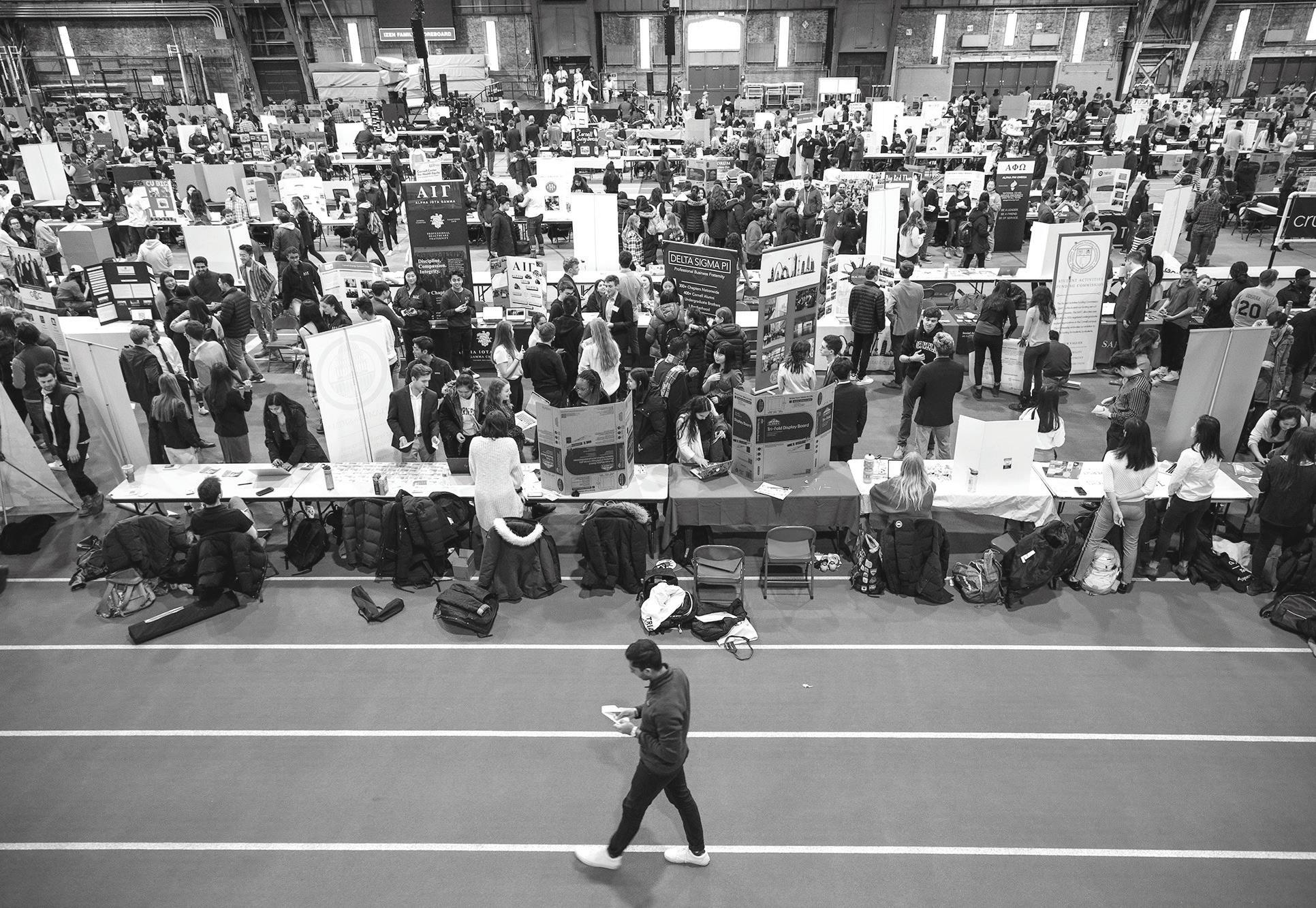
GABRIEL LEVIN ’26
Editor in Chief
MAX FATTAL ’25
Associate Editor
HENRY SCHECHTER ’26
Opinion Editor
MARIAN CABALLO ’26
Multimedia Editor
MING DeMERS ’25
Photography Editor
ERIC HAN ’26
Arts & Culture Editor
SYDNEY LEVINTON ’27
Arts & Culture Editor
JADE DUBUCHE ’27
Social Media Editor
JESSIE GUILLEN ’27
Graphics Editor
JOLIN LI ’27
Layout Editor
PARIS CHAKRAVARTY ’27
Layout Editor
LEILANI BURKE ’25
Assistant Photography Editor
KARLIE McGANN ’27
Assistant Photography Editor
KIRA WALTER ’26
Lifestyle Editor
DANIELA ROJAS ’25
Assistant Lifestyle Editor
NICOLE COLLINS ’25
Weather Editor
To the Editor
JULIA SENZON ’26
Managing Editor
ERIC REILLY ’25
Assistant Managing Editor
MARISA CEFOLA ’26 News Editor
MATTHEW KIVIAT ’27 News Editor
CHRISTINA MacCORKLE ’26 News Editor
JANE McNALLY ’26 Sports Editor
GABRIEL MUÑOZ ’26 City Editor
KAITLIN CHUNG ’26 Science Editor
LAINE HAVENS ’25 Science Editor
ANUSHKA SHOREWALA ’26
Assistant News Editor
OLIVIA HOLLOWAY ’25 Assistant News Editor
DOROTHY FRANCE-MILLER ’27 Assistant News Editor
DINA SHLUFMAN ’27
Assistant News Editor
ALLISON HECHT ’26
Newsletter Editor
Whenever I attend a protest or a rally, it has always been because my heart led me there. When I watch a video of a seven year old child, bleeding from the ear, hair white, covered in rubble, mumbling “where is my mommy?” I think about my own seven year old brother and wonder what kind of world I want him to grow up in. So when a columnist claims that anyone rallying for Lebanon must be doing so because they are in support of Hezbollah or because of their “thinly disguised antisemitism and hate for Israel,” it annoys me. While I find that accusation to be an overused trope and in many ways ahistorical, my annoyance stems more from the increasing normalization of ignorance in journalism. We must rally for Lebanon.
The war on Gaza continues to set new (devastating) precedents for modern warfare. According to CNN , over the course of Sept. 24 and 25, Israel pummeled southern Lebanon with 2,000 munitions and 3,000 airstrikes. Perhaps, we must congratulate Israel for achieving, in two days in Lebanon, what took the US a year to accomplish in Afghanistan. Whenever Israel attacks, it permits itself to forgo all rules of modern methods of warfare: principles of distinction, proportionality and precautions in attack. Israeli leadership uses 2,000 pound bombs in capital cities despite it being unlawful. That country really is its own role-model, spreading terror, displacement and death in the Middle East.
On Jul. 19, for the first time since the Israeli occupation began in 1967, the International Court of Justice released a ruling, accusing Israel of practicing separation in the Palestinian occupied territories. This means Israel has officially been found, by international law, to be a state that practices illegal “separation, differentiation of treatment and systemic discrimination.” As an international community, is this not enough grounds to condemn Israel the same way our University leadership has condemned other nations in the past? Fellow Cornellians, the contradictions are clear. Let us rally for Lebanon because we stand in solidarity with the over 1,000 civilians and 1 million displaced whose lives were forever changed by an illegal occupying state.
– Kingsley Onyedikachi Aaron-Onuigbo ’27
Noah Farb is a first year student in the College of Arts and Sciences. His fortnightly column Tinking Critically discusses politics and current events. He can be reached at nef36@cornell.edu.
On September 25th, there was a flier stuffed under my dorm door advertising a rally planned by Cornell’s Coalition for Mutual Liberation, a group that supports and advocates for Cornell to divest from Israel. The rally was prompted by the possible deportation of British Cornell graduate student Momodou Taal for international student visa violations resulting from his suspension.
The specificities of the Taal case are complicated, and despite my personal beliefs about him and his movement, what I was more concerned with on the flier was that the same people supporting Taal were also, “RALLY[ING] FOR LEBANON.”
The all-caps inclusion of Lebanon on the flier under my door would seem to be the result of the Israeli Defense Forces recent precision strikes against top Hezbollah commanders and operatives. Hezbollah is a powerful paramilitary terrorist organization that operates within Lebanon as a “state within a state,” exercising substantial political and social power. Apparently these precision strikes, while cheered across the middle east from Syria to Iraq, are upsetting to those at Cornell who support terrorist activity in the Middle East. Hezbollah is no friend to America; in 1983 the group killed over 200 U.S. Marines. Similar to those at Cornell who were “exhilarated” by the horrific October 7th attacks upon Israeli civilians, CML seems to care more about the destruction of Israel than they do about the plight of the Palestinian people. Cheering for Hezbollah clearly exposes this hatred.
In no way can I comprehend how clear-thinking, well-educated Cornell students (and faculty) can gather in support of Hezbollah, as that is what the CML poster seemingly referred to. The terrorists of Hezbollah, began the conflict between Israel and Hezbollah on October 8th, 2023, before Israel had fired a single shot into Lebanon. At that time, Israel was still fending off Hamas’s infiltration of its border. Hezbollah has launched over 8,000 rockets armed projectiles into Israel indiscriminately killing Israeli Druze children and internally displacing 70,000 Israelis. Is this the group Cornellians feel the need to protest for? And if it is, why?
If the CML and whatever other groups organized the rally truly cared about the collateral damage stemming from the recent targeted attacks on
Hezbollah, why are they not similarly outraged (and rallying) on behalf of innocent victims of tragic events in places like Ethiopia, Burma and South Sudan.
Israel is the only country in the world that people often question its very existence. Many of those rallying with the CML “Lebanon” and “exhilarated” by the attacks on Israel seem to be protesting out of thinly disguised antisemitism and hatred for Israel.
I ask this question rhetorically, but what would you do if you had a, and I use this term carefully and definitionally, a genocidal enemy on your doorstep reaching their hand through your window.
I would be the first to acknowledge that this conflict is complicated and there are many moving pieces, but to those supporting “LEBANON,” please engage in some critical thinking. Do you really know what and who you are supporting?
Hezbollah is a terror organization that seemingly has no care for those closest to them, especially the Lebanese Christians and Sunni Muslims. By targeting and reducing the massive amount of weapons Hezbollah commands, Israel significantly limits the destruction of any future conflict. Israel’s alleged pager and walkie talkie attacks are a precise way of targeting an enemy from afar. The targeted assassinations of top Hezbollah leaders serve to cut the organization at its head to expedite the fighting with as few non combatant casualties as possible.
CML is a group that represents over 40 Cornell organizations. I hope that those supporting this organization can reconsider their alliances as it is evident that they are not coming from a true place of caring about Palestinian lives. The group is primarily a vessel to disparage and attack Israel and Zionists at Cornell.
The Lebanese people would be far better off without the terrorists of Hezbollah living within their nation. If you genuinely care about the Lebanese people, you should be protesting to rid Lebanon from Hezbollah, no different than if you genuinely support a free Palestine, you should be protesting to Free Palestine from the equally depraved terrorists of Hamas. To the Cornellians supporting Hezbollah, your agenda is apparent and your stance on America, Israel and Western Society is known.
From Seth Berman’s Oct. 2 column on the risks of the resume:
The resume has become the most important, and ironically least effective, tool in nearly every job, internship or club application. It is so important that it has created an entirely new field of professionals — “resume experts” — dedicated to writing, fixing or editing a resume. And rightfully so. It is the first and often the last tool that determines whether a candidate reaches the next round, gets the position or is dismissed
without further consideration. In fact, around 75 percent of job resumes are disqualified by Applicant Tracking Software (ATS) before a human even gets a chance to read them. This is how it goes; we don’t question it, we just submit. However, maybe it is time we take a step back and reconsider if this process is the best way to find candidates. Reducing a candidate’s worth to a list of keywords and neatly aligned bullet points is entirely misguided.
To the Editor (10/8):
My comments, in response to a question from a participant in the meeting about the KKK, were made in the context of my being challenged on why Cornell is allowing some hurtful speech to take place and to illustrate Cornell’s deep commitment to free expression. In retrospect, it was a terrible analogy that was posed, and a false equivalency, and I should have said as much in response. To be clear, the KKK is abhorrent by any standard, and Cornell University would never invite a representative of the KKK to campus. Any speaker invited by a faculty member or student organization is reviewed by the University Events Team and is only allowed to come to campus if the safety of all in our community can be assured.
— Joel Malina, Vice President for University Relations
To the Editor (10/2):
In The Sun’s article, “Administrators Discuss Disciplining Protesters, Monitoring Faculty in Private Hillel Parents Meeting,” I was quoted as suggesting that “in-class activities of our faculty” will “be scrutinized.”
My intent was to reference the University’s Policy Statement on Academic Freedom and Freedom of Speech and Expression and the American Association of University Professors Statement of Principles on Academic Freedom and Tenure, which notes that, in the classroom, professors should “be careful not to introduce into their teaching controversial matter which has no relation to their subject,” and “should at all times be accurate, should exercise appropriate restraint, [and]…show respect for the opinions of others.” University administrators have no purview over classroom instruction, nor should they. Any review of faculty classroom activity appropriately lies with the faculty, who are committed to promoting inclusive academic spaces that are free of unlawful discrimination or harassment.
I thank the members of Cornell’s faculty who reached out to me to express understandable concern.
— Joel Malina
Dear Interim President Kotlikoff (10/2),
I write to you this morning as a colleague and fellow classroom educator. My purpose is to raise some concerns about this morning’s article in The Sun, in which Vice President Joel Malina is reported to have told a Zoom gathering that the University plans to “scrutinize” the in-class activities of Cornell faculty.
Just a few weeks ago, you invited the campus community to embrace fair-minded discourse. Mr. Malina’s brazen declaration that the activities of faculty will now be proactively scrutinized by your office makes that invitation ring hollow, if not outright disingenuous. Universities are communities of trust, and with just a few words, Mr. Malina shattered that trust.
It is not just that the idea of being “scrutinized” makes our jobs harder. It certainly does. What is most unnerving is that the prospect of administrative surveillance impoverishes any chance of fostering genuine discourse as you yourself have envisioned it.
Many of my classes entail extemporaneous discussions, in which students converse about complex social and cultural issues that have the potential to be unsettling. In these situations, I am constantly amazed at the care with which Cornell students choose their words, and the generosity they show one another when words fail. They set an example that you and Mr. Malina would do well to follow. They approach one another with trust, not suspicion.
For professors, the work of creating an environment in which all members of a classroom feel seen, not scrutinized, is tremendous. It takes hours of preparation just to begin, and it takes years of practice to master. It also takes the trust of an institution and its leadership.
After more than 20 years in the classroom, from graduate school through my time at Cornell, I have learned that if students feel that their teachers are scrutinizing what they say, the result is silence. If students feel trusted to explore ideas, the result is education. And when professors — as we surely will after this morning’s Sun story — teach from a place of fear rather than trust, the result is generalized apathy at best, widespread paranoia at worst.
In other words, the victim of Mr. Malina’s appalling statement is discourse itself.
I urge you to state categorically that preemptive administrative scrutiny of classroom activity has no place here, or at any university worthy of the name.
With respect, — Prof. Alex Nading, anthropology
To the Editor (10/2):
As the Cornell University administration continues to threaten Black graduate student Momodou Taal with de-enrollment and deportation we, as organizations representing Black students, want to reiterate that Black students do not feel safe at Cornell.
On Monday, Black Students United met with Interim President Kotlikoff to discuss Taal’s case and the safety of Black students on campus.
BSU, which represents more than one thousand Cornell students, left feeling disillusioned and unconvinced by his reassurances.
“How can we feel safe when this University has the power to silence and criminalize a powerful Black voice without due process or just cause?” said a BSU representative.
Additionally, as Black students, we remain distressed by a pattern of racialized rhetoric on the part of Kotlikoff. His statements justifying Taal’s unfair and punitive treatment are infused with language that reflects the painful legacies of enslavement, Jim Crow and modern-day policing that continue to infect every inch of American society today.
In campus-wide emails sent on Monday, Sept. 23 and Monday, Sept. 30, Kotlikoff and Interim Provost Siliciano drew on a long lineage of white supremacist caricatures of Black people, referring to Taal’s actions as “aggressive,” “intimidat[ing],” “frightening,” “highly disruptive and intentionally menacing” and “harassing,” thus depicting a Black graduate student as a violent person who is a threat to campus security.
Let us be clear. There is no evidence that Taal has engaged in any violent activity. He has resorted to peaceful means to protest a violent genocide in which Cornell is complicit.
Yet the University has chosen to slander Taal using fear-mongering language and continue to deny him due process.
Even The Sun’s Editorial Board declared last week that “Cornell Unjustly Punished a Pro-Palestinian Activist,” and stridently disputed Kotlikoff’s claims, writing
that Taal has been subjected to a “kangaroo court in which the provost serves as judge, jury and executioner.”
The University criminalizes Black existence — Taal’s suspension makes this clear.
Rather than hide behind hyperbole to manufacture consent for Taal’s punishment, we call on Kotlikoff and his administration to stay true to Cornell’s core value of “free and open inquiry and expression” by reversing Taal’s suspension, agreeing to comprehensive academic freedom protections with Cornell Graduate Students United-UE and creating an open forum to repair the administration’s relationship with Black students.
Four years following the 2020 slaying of George Floyd in Minnesota, Kotlikoff seems to have forgotten Cornell’s stated commitment to anti-racism. Fortunately, we’ve compiled a beginner-friendly booklist to remind him of his obligation to “stand up for those who are oppressed or marginalized.” Many of these books are even available for purchase at our local bookstores:
1. How to Be an Antiracist by Ibram X Kendi (available for free on Cornell’s Canvas)
2. White Fragility: Why It’s So Hard for White People to Talk About Racism by Robin DiAngelo
3. Between the World and Me by Ta-Nehisi Coates
4. The New Jim Crow by Michelle Alexander
5. Just Mercy by Bryan Stevenson
We hope that he will find these suggestions constructive and welcome additional invitations for discourse.
Signed, Sophia Jahadhmy, President of Africana Graduate Student Association
Seth Vieira, Co-Political Action Chair for BSU Jawuanna McAllister, Bargaining Committee Member for CGSU-UE
Talyia Griffin, Community Service Chair for BGPS
By SARVESH PRABHU Sun Contributor
Prof. Nicola Dell, information science, has been awarded the prestigious MacArthur Fellowship. This award — referred to as the “Genius Grant” — provides recipients with $800,000 to be used towards impacting society in significant and beneficial ways, according to the MacArthur website.
Dell was recognized for her work developing technological interventions to address the needs of overlooked populations, particularly survivors of intimate partner violence.
Her vision for her signature project, the Clinic to End Tech Abuse, is that “everyone should be free to use technology without fear of harm from abusive partners or others,” according to CETA’s website.
Dell’s research focuses on the interface between technology and humanity. She works to develop interventions to protect against harmful uses of technology on victims of intimate partner violence. She also studies the abuse’s effect on family caregivers and school teachers in overlooked communities including India.
Dell draws upon her upbringing in Zimbabwe in her interest in
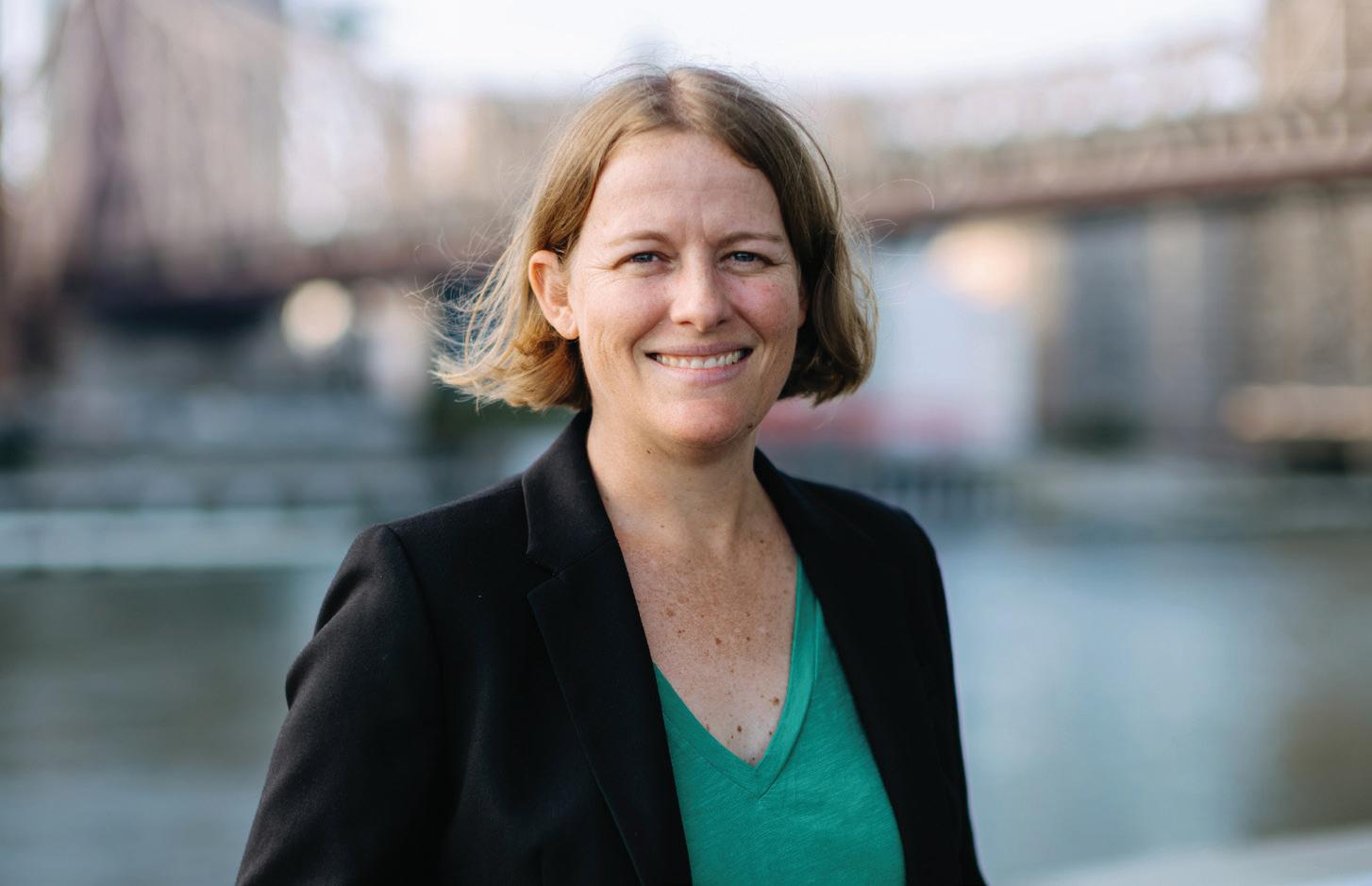
human-computer interaction.
She was formally exposed to HCI during her time as a graduate student at the University of Washington and combined her knowledge of technological progress with experiences with underserved communities in Zimbabwe.
With the MacArthur grant, Dell aims to expand CETA’s reach.
“The goal is to grow the clinic across the U.S. and the world,” Dell said.
“We want to broaden the reach of the clinic and support other people to build technology clinics for overlooked communities.”
Vince Bartle, a Ph.D. candidate under Dell said that he was inspired to join her research due to his interest in “what it means to be human and care for each other and how it can interface with technology.” Bartle also said he wanted to work with Dell since she was
“the most kind professor [he] knew.”
This human-centered approach is evident in Dell’s day-to-day interactions and work ethic, according to Bartle.
“She really focuses her efforts and it is clear that she spends a lot of time on what she does,” Bartle said. “She has repeated evidence of driving forward a vision with focus and does this while being kind and thoughtful in the process.”
Ian Solano-Kamaiko, a Ph.D. student, echoed that Dell “cultivates an auspicious environment for [him] to succeed” as his advisor.
“As a researcher, I have learned from her guidance, of the work and the intricacies of academia as well as navigating the job sector,” Solano-Kamaiko said. “She as an advisor is looking out for my best interest and has my back.”
Dell’s advice to students interested in human-computer interaction is to focus on collaboration and community.
“The key ingredient is community engagement and working with partners with domain expertise,” Dell said. “Who can you partner with? How can you contribute to what they are doing?”
Sarvesh Prabhu can be reached at sp2575@cornell.edu.
By LAINE HAVENS Sun Science Editor
The Europa Clipper is a flagship National Aeronautics and Space Administration mission to investigate the habitability of Jupiter’s moon Europa. Scientists think that Europa’s icy surface may hide deep oceans holding the ingredients for life.
The Europa Clipper launch was initially scheduled for Thursday, Oct. 10, but NASA postponed the launch in anticipation of Hurricane Milton.
Several Cornell faculty members, graduate students and research associates have contributed to the mission’s scientific and technical development.
“While it’s always disappointing to have a setback, we have a 30-day launch window, so we are not at risk of having to scrap the launch altogether,” wrote Ph.D. student Jorge CoppinMassanet in an email statement to The Sun. “Hopefully this does not take away any momentum from the excitement we’ve been building up and nobody is greatly affected by Milton.”
NASA’s Europa Clipper carries nine science instruments, each playing a different role in collecting information about the icy moon. After its launch at NASA’s Kennedy Space Center in Merritt Island, Florida, the clipper will spend six years traveling to Europa. Once it arrives, the spacecraft will orbit Jupiter, approaching Europa nearly 50 times to collect data over three years.
“I have a deep love and appre-

ciation for Europa,” said Ph.D. student Charlie Detelich. “It’s so exciting that we actually get to go explore it and test whether or not our hypotheses are real or not [and] maybe see if there’s ingredients for life.”
Detelich is part of the Comparative Planetology and Solar System Exploration Research Group led by Prof. Alexander Hayes ’03 M.Eng. ’04, astronomy, who also works with the Europa Clipper mission.
As a graduate affiliate of the Europa Imaging System — the clipper’s visible light camera system — Detelich has assist-
ed with camera calibration and mission organization. Detelich also created maps to plan what parts of Europa the clipper will image. Scientists will use models of geologic feature formation like Detelich’s to understand Europa Clipper data.
“The surface [of Europa] is really complicated looking, and it’s overwhelming,” Detelich said. “I can’t imagine how much more overwhelming but exciting it’s going to be when we have imagery [from the Europa Clipper] that’s [around] 100 times better than we have right now.”
While Detelich analyzes geo-
logic features, Julie Rathbun M.S. ’97 Ph.D. ’99, a senior research associate at the Cornell Center for Astrophysics and Planetary Science, investigates geologic activity. Rathbun is a co-investigator on the Europa Thermal Emission Imaging System — a thermal camera that will use infrared light to map surface heat. Areas of above-average heat may indicate geologic activity, like ice volcanoes or tectonics, according to Rathbun.
“If there is [geologic] activity on Europa, we really should see it,” Rathbun said. “We’ve designed the mission looking for activity, so if we don’t see it, it’d
be very bad luck. If we don’t see it, I would bet money that there is [no activity], which would be unfortunate, but I’m really hopeful we’ll see something.” Rathbun is part of a scientific team that informs the mission, such as planning where the spacecraft will look on Europa. As a co-investigator for E-THEMIS, Rathbun will work with the clipper mission for its duration and will be among the scientists analyzing its data.
“It is a challenge to work in such a large group [of mission scientists], but it is also a joy,” Rathbun said. “A lot of the folks on this mission are people I’ve known in my scientific career as colleagues and friends for some of them almost 30 years.”
While Rathbun and Detelich work on the science of the Europa Clipper, others at Cornell contribute to the technical side, like CoppinMassanet. Coppin-Massanet is a graduate student working with Prof. Britney Schmidt, earth and atmospheric science and astronomy. Schmidt is a co-investigator on the Radar for Europa Assessment and Sounding: Ocean to Nearsurface, a science instrument on the clipper that will use radio waves to study Europa’s ice shell and oceans.
To continue reading this article, please visit www.cornellsun.com.
Laine Havens can be reached at lhavens@cornellsun.edu.
By Sanika Saraf
Sanika Saraf is a freshman in the School of Industrial & Labor Relations. She can be reached at ss4353@cornell.edu.
The other day, after seeing dead leaves on the ground and feeling a slight breeze on my shoulders, I smelled it. Notes of nutmeg, cinnamon, and cloves mixed with the comforting and creamy flavors of coffee and milk. My legs took me to the nearest coffee shop to buy my favorite fall drink: the Pumpkin Spice Latte.
However, my excitement for all things autumn was crushed once I realized that I paid $6 for a mediocre beverage at best. Armed with my immense passion for finding the best value drinks, I ranked PSLs across campus and Collegetown to satisfy my fall cravings. Though PSLs are traditionally served hot, I refuse to have hot lattes when it’s still over 60 degrees outside. Besides, I’ve noticed cold beverages are more popular among the Cornell student body than hot ones.
Following two weeks of comprehensive research, here is my PSL ranking for five of Ithaca’s best coffee spots based on overall flavor, coffee quality, and value.
Libe
Libe Cafe serves the traditional, iconic, PSL brand: Starbucks. So, I entered through Olin with hefty expectations, however, it was a huge letdown. I literally couldn’t get through more than 3 sips of the drink. I was attacked with an artificial pumpkin flavor that was so overpowering I physically choked. Think of chugging artificial pumpkin puree from a blue plastic straw – this was my exact experience. The Starbucks
Libe was a disappointing start to my PSL journey, but I guess this should encourage you to support small businesses.
De Mokha Cafe
This was my first time trying this cafe, and I was super excited upon seeing that they use Yemeni coffee beans. While this latte was pretty good by regular coffee standards, it was not a PSL. In fact, I was actually questioning if I ordered a PSL or just a typical iced latte. There was no pumpkin spice flavor, which was a little suspect as I paid almost $8 for a 16oz drink. De Mokha definitely delivered on the espresso front, however, I’d be careful about buying a flavored latte here.
Cafe Jennie
Serving Peets Coffee, Cafe Jennie is my go-to central cafe. When ordering, I wasn’t expecting much because To my surprise, Cafe Jennie delivered a solid latte that could potentially hit the spot if you’re craving pumpkin pie. Upon one sip, I was hit with a wave of pumpkin, which balanced with milk was not overwhelmingly sweet at all. However, the PSL leaves a bitter and artificial taste in your mouth due to the boldness of the espresso. I think, in particular, a lighter or blond espresso would’ve complimented the syrup and coffee taste. Additionally, I detected no spice flavor in the drink, making the beverage feel quite one-dimensional. If you ever order Cafe Jennie’s PSL, I would recommend sprinkling cinnamon in the drink for an extra dash of

complexity. Peet’s delivered a solid pumpkin latte, but I’m not sure if you could call it a pumpkin spice latte.
Gimme Coffee
An iconic Ithaca coffee vendor, Gimme Coffee never disappoints. I thoroughly enjoyed the nuance of Gimme espresso with hints of cinnamon and nutmeg. That being said, the pumpkin component of this PSL is extremely mild. Rather than tasting it as you’re drinking the latte, it’s merely an aftertaste left on the tongue.
This drink feels more like an iced chai than a pumpkin-spiced latte, but nonetheless, the quality of Gimme Coffee is unmatched –they have their latte recipe down to art. If you’re looking for a comforting spice with rich coffee shining through, Gimme Coffee’s PSL does just that.
CTB
I honestly did not expect to award Collegetown Bagels number one. I always thought CTB was overpriced and overhyped, but surprisingly, they delivered one of the best PSLs I’ve tasted. The combination of coffee and pumpkin was flawless – it wasn’t too decadent, but it had a nice cinnamon flavor that added a perfect touch of sweetness to the drink.
My only complaint was that the pumpkin syrup coagulated at the bottom as I drank, but I was seriously nitpicking. While $6.50 is on the steeper side, I’m willing to empty my pockets for a drink like this.

By Tiffany Ma
Tiffany Ma is a junior in the College of Arts & Sciences. She can be reached at tcm96@cornell.edu
It was just another Friday night in October when my friend texted me: “It’s stoplight themed. So make sure you wear green.” For those unfamiliar, stoplight themed parties are exactly what they sound like—wear red if you’re taken, yellow if it’s complicated, and green if you’re single. I politely declined, but not before realizing I’d be the only one wearing green out of my friends.
As I head into the winter of my junior year, one thing has become glaringly obvious: nearly everyone I know is entering a relationship. The pressure to pair up becomes palpable when it feels like everyone around you is doing the same, and there’s constant chatter about how crucial a relationship is to your college experience—especially now, with cuffing season heating up and the holidays just around the corner. And at that moment, I had to wonder: is “cuffing season” actually real?
Cuffing season is essentially a scramble to find your other half just in time for the colder months—because, honestly, what fun is pumpkin picking alone? And wouldn’t it be nice to have someone by your side for all those fall and winter traditions? After all, you could finally indulge your relatives at Thanksgiving with their expectations of double-legacy babies.
It seems like everyone I know has fallen into this cycle of scouting, drafting, preseason, and full-on cuffing, but who’s to say this is a recipe for success?
When I mention that I’m 20 years old and have never been in a relationship, the reactions I get range from surprised at best and unsettled at worst. But really, why is that so horrifying? Is it societal expectations, or is Ithaca just that hard to navigate alone? If cuffing season really is a thing and upperclassmen are all suddenly itching to “settle down,” then I have to ask—how much does “settling” have to do with “settling down”?
Thanks to my extensive knowledge of Sex and the City, there’s a theory that aims to answer this: the Taxi Cab Theory. It suggests that love isn’t really about commitment, but all about timing—or maybe it’s about being so exhaust -

ed from bad first dates that you just give in. But before we dive too deep, let’s go back to where it all started: a classic Sex and the City episode—season 3, episode 8— where Charlotte York becomes engaged after falling head over heels in just two weeks.
Cue Charlotte, ever the hopeless romantic, who gushes, “Sometimes you just know, it’s like magic, it’s fate.”
And that’s when Miranda Hobbes, the ultimate realist, explains: “It’s not fate, his light is on—that’s all. Men are like cabs. When they’re ready, their light turns on. They wake up one day and decide they’re ready to settle down, have babies, and boom—the next woman they pick up is the one they’ll marry. It’s not destiny, it’s dumb luck.”
I’ll admit, there might be some truth to this theory, but I can’t help but wonder—how does the Taxi Cab Theory, with its focus on thirty-something relationships and marriage, relate to us, here and now, as Cornell students?
Believe it or not, this theory might apply even more to us than it did back in the Sex and the City era of the early 2000s. With dating apps and social media making it easier than ever to see endless options, the ‘grass is greener’ mentality is more present than ever. In 2024, with all the swiping, ghosting, and Instagramstalking, maybe commitment is still all about timing. Eventually, after enough bad dates and cold Ithaca nights, we just... settle. Call me a hopeless romantic, but I refuse to believe that love and commitment are mutually exclusive. Miranda’s theory implies that men don’t want to commit until they randomly wake up one day and decide they’re ready, and while there’s probably some truth to that, it also feels a bit fatalistic. Timing matters, sure, but connection—real connection—isn’t something you can rush or just stumble into.
So, here’s to not settling for the sake of settling down. Because no matter what season it is, the right time will come, and when it does, it’ll be about more than just a light turning on.


By HAMNA WASEEM Sun Staff Writer
Oct. 4 — As the leaves change color and the air turns crisp, a new season unfolds at Cornell — especially for members of the Jewish community.
From Wednesday to Friday, students celebrated Rosh Hashanah, marking the Jewish New Year with meaningful services, festive meals and diverse gatherings.
“A fresh start is exactly what we need right now, especially after such a hard year,” said Ezra Galperin ’27, the house manager of the Center for Jewish Living. “I don’t think it’s a secret why I’m saying that.” our disposable products,” Cutler said. “When they come back, they could exchange it for a clean container.”
Amid a nationwide uptick in antisemitism and Islamophobia since the Israel-Hamas war began on Oct. 7, 2023, Jewish Cornell students have grappled with tense campus situations.
Last October, former Cornell junior Patrick Dai ’24 posted several threats to Jewish students on Greekrank, an anonymous discussion forum. One post threatened a mass shooting at 104West!, which houses Cornell’s CJL and kosher dining hall. In August, Dai was sentenced to 21 months in federal prison.
Galperin said he was determined to celebrate Rosh Hashanah to its fullest while keeping all the lives lost in the war in mind.
“That 101 of our people are still in captivity definitely makes it bittersweet, but it’s important we go into the holiday with more joy than ever,” Galperin said. “The goal of Hamas and other organizations like that is to break the Jewish spirit,
and we’re not going to let them do that.”
According to Israeli authorities, more than 60 living hostages and the bodies of approximately 35 people who were held in captivity by Hamas but are now thought to be dead remain in Gaza.
Benjamin Malekan ’25, the president of the CJL, echoed a similar message of hope.
“When terrible things happen to us, it’s our responsibility to be only more happy and joyful,” Malekan said. “It’s very important for me to keep all the people in Israel in mind while we do all those things.”
Cornell Hillel held various services for Rosh Hashanah, including Orthodox, Conservative and Reform options. The organization also hosted a Rosh Hashanah banquet at Trillium on Wednesday along with various other gatherings throughout the holiday.
Students could also choose to celebrate in smaller, more intimate gatherings with friends.
Through Hillel, students could receive funding for personal gatherings, with $10 provided per guest for up to 15 people.
“Hillel is actually incentivizing students to host people at their own homes, so I’ve been fortunate enough to be invited to the home of a friend of mine for a meal over Rosh Hashanah,” Galperin said.
These sponsored meals can be especially beneficial for people who want to honor customs specific to their cultures.
“I’m a Persian Jew, and we have a lot of different customs I’m not sure other Jews have,” Malekan said. “For example, we have a cow tongue [at the Rosh Hashanah
dinner], so our year is like a head and not a tail.”
While different Jewish communities have varying traditions, one thread connecting them all this Rosh Hashanah is hope and resilience, according to Galperin.
“Our community is closer than it ever has been,” Galperin said. “We’re more proudly Jewish than we ever have been and we’re going to celebrate the holiday with as much spirit as we possibly can.”
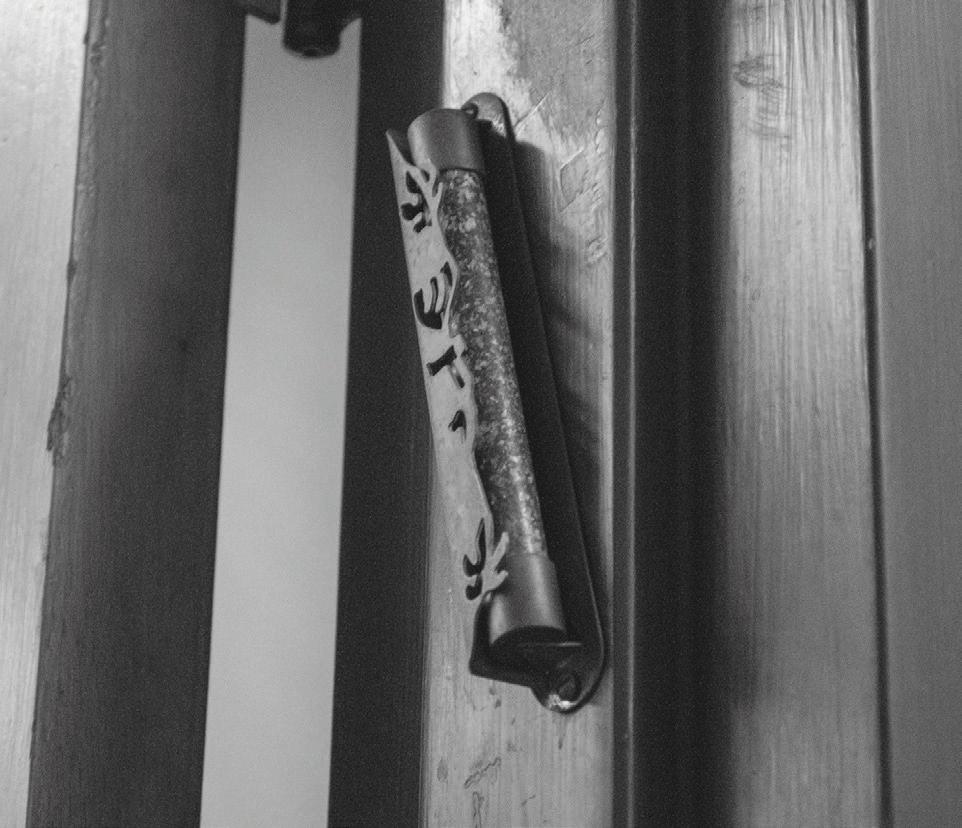
That’s a good class of people within the engineering department or within [computer science].”
Anude said that despite being from different places, “being Black and Black engineers we underst[and] going into our classrooms, we’re facing the same thing — [it’s] a bonding experience.” She highlighted NSBE’s crucial support as the only Black woman in her graduating class of electrical and computer engineering.
“I feel like I wouldn’t be where I am academically or professionally if not for NSBE. I found all my mentors through NSBE,” Anude said.
“I wouldn’t be where I am academically or professionally if not for [the National Society of Black Engineers]. I found all my mentors through NSBE.”
Chimdi Anude ’25
Underrepresented Minorities in Computing
Underrepresented Minorities in Computing seeks to promote diversity in computing and empower underrepresented groups through academic support, community and professional development.
Celeste Naughton ’25, co-president of Underrepresented Minorities in Computing, also said recruiting incoming students has been challenging without access to the lists of incoming Black and Hispanic students interested in computer and information science previously provided by the Office of Inclusive Excellence.
In previous years, URMC would send personalized emails to minority students about the club and its upcoming events, but since the repeal of affirmative action, the club is not able to reach out to potential new members in this way, Naughton said.
Naughton noticed a decrease in engagement in URMC, with a drop in applications for the organization’s freshman representative position, attendance at their welcome back barbeque and interest in their mentorship program.
“11 percent to seven percent is a lot in terms of students in our community — [a] four percent [drop] of, let’s say it’s 1,000 students, right?” Naughton said, referencing this year’s drop in Black first-year enrollment. “Four percent of 1,000 students is 40 students.
During the 2023 fall semester, URMC hosted a class on software engineering recruitment. URMC’s advisor informed them that the event application form had to be open to all students, not only URMC members.
“We had to be very cautious about language and wording,” Naughton said. “We couldn’t ask ‘How do you identify?’ It has to [be asked more creatively], like ‘Tell me a story about this particular aspect of your identity.’ And that helps to not explicitly ask.”
American Indian Science and Engineering Society
Cornell’s American Indian Science and Engineering Society aims to advance American Indian scholars in STEM by providing academic support, community and professional development, creating a space where Native students feel supported and less isolated in a challenging field.
Peter Thais ’25 — co-president for the American Indian Science and Engineering Society and the internal relations chair of Native American Indigenous Students at Cornell — said the decrease in incoming Native American students has created a noticeable impact on a community that is already very small on campus.
Native American student enrollment decreased from 1.8 percent of the 2023 incoming class to one percent of the 2024 incoming class. Last year, AISES got just two applications for the freshman representative position. This year, AISES saw zero applications.
The American Indian Science and Engineering Society did not receive a list of all incoming Native American, Pacific Islander and Alaskan Native students through the American Indian and Indigenous Studies program as it had in previous year.
According to Thais, the Native American Mentorship program previously had at least 10 incoming student participants per year. This year, only two students signed up for the program.
“We will work around their time because we want to make sure that these two people are being given as much attention as possible,” Thais said. “Since Indigenous student admission has gone down, I think the best you can do is at least try to improve Indigenous retention.”
Importance of Academic Affinity Groups
Leadership of affinity organizations hold monthly meetings with the Office of Inclusive Excellence in the College of Engineering. During this month’s meet-
ing, leaders from numerous organizations including NSBE, URMC, AISES and five other organizations discussed an overall decrease in first-year students.
“Something that we’re all working on together as these groups for underrepresented peoples is to emphasize the importance of identity and community within our organizations,” Thais said. “All of us as senior leadership in that meeting stressed that these organizations have been integral to our professional development and overall student wellbeing at this University.”
“I think it’s important for myself to want to be a leader in these kinds of communities, because I feel like from a cultural standpoint, I was taught to make my ancestors and those that came before me proud and lead the way for those that come after me.”
Peter Thais ’25
Thais emphasized the personal significance of leading an affinity group in creating opportunities for other Native American students.
“I think it’s important for myself to want to be a leader in these kinds of communities, because I feel like from a cultural standpoint, I was taught to make my ancestors and those that came before me proud and lead the way for those that come after me.” Thais said.
Looking to the future, leaders of affinity groups hope to collaborate on events to boost student engagement and provide community and resources to as many underrepresented students as possible.
“I’m doing all of this so five years down or 10 years when I’ve gone off, … people are still reaping the benefits of the hard work and the cycle to increase the number of Black engineers continues,” Anude said. “So being able to participate in such a legacy is such an honor.”


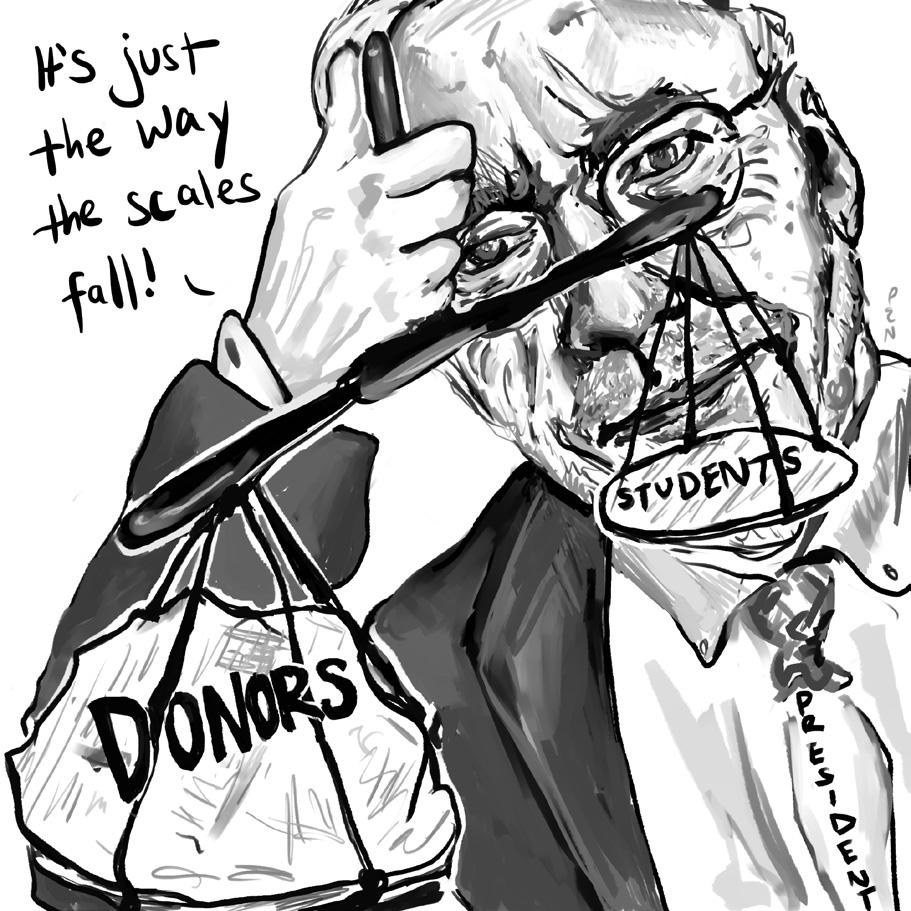


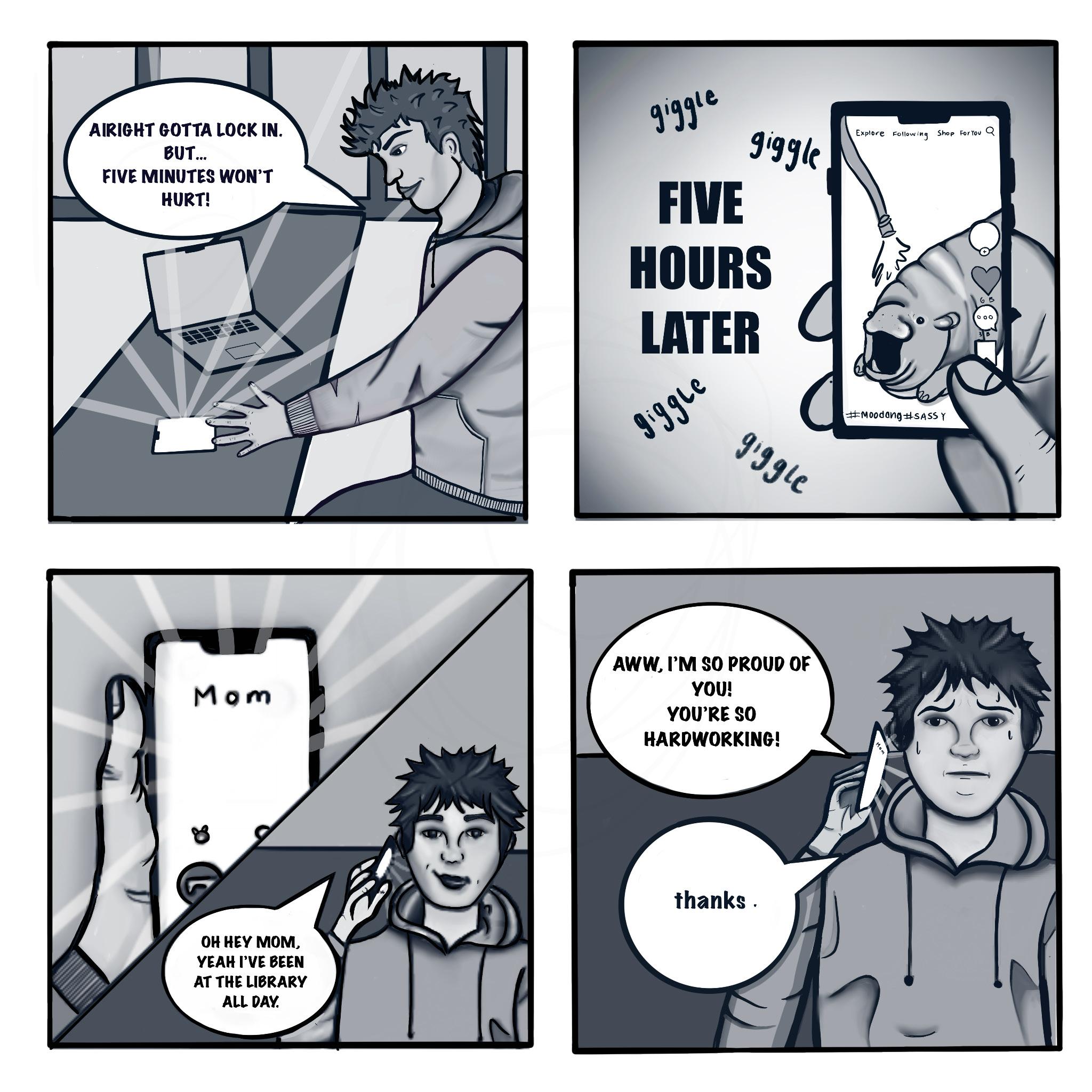

and off-campus activism and continues to teach students.
“Oct. 7 was [for me,] like how my parents, who were in New York for 9/11, describe what it felt like in the moment — it felt like that times a million,” Shapira said. “The attack is as personal as it gets — my friends were at [the] Nova [music festival, and] I have friends who are soldiers who subsequently went to serve in Gaza.”
Following the attack, about 750 members of the Cornell and Ithaca community joined together on Oct. 11, 2023, to mourn the lives of those lost on Oct. 7.
Prof. Russell Rickford, history, said he was “exhilarated“ by the Hamas-led attack on Israel at a pro-Palestine rally in Ithaca Commons held on Oct. 15. His statement was widely condemned, including by University leadership. He later apologized and took a voluntary leave of absence for the academic year, which he returned from this fall.
Following his remarks, some petitions called for the dismissal of Rickford, while others defended the professor, each gaining thousands of signatures. Black Students United, following Rickford’s remarks, released an Instagram post defending him.
Rickford, despite the backlash from his previous comments, is still involved in on
Shapira said that following the first vigil, statements from pro-Palestinian organizations and activists caused Jewish students to feel uncomfortable and unsupported following the attacks.
“What was so terrible about what was going on, is the fact that there is a group of students that celebrates [the Oct. 7 attack], that feels, to quote their professor that they look up to, exhilarated and excited by the attacks and rapes and murders of civilians,” Shapira said. “It’s quite unfortunate that you almost feel not only not supported on your own campus, but rather attacked.”
Reacting to Rickford still having a platform on campus, Ezra Galperin ’27, at-large student assembly representative, reflected on the implications of the professors’ words and the concern of him still teaching this semester.
“Professor Rickford’s comments were objectively abhorrent — there’s no defending his comments,” Galperin said. “I do think based on those comments, we should be really concerned about what’s happening in his classroom — if he’s exhilarated by the rape and murder of Jews, what kind of environment is he going to create for Jewish students in his classroom?”
On Oct. 28 and Oct. 29, 2023, several
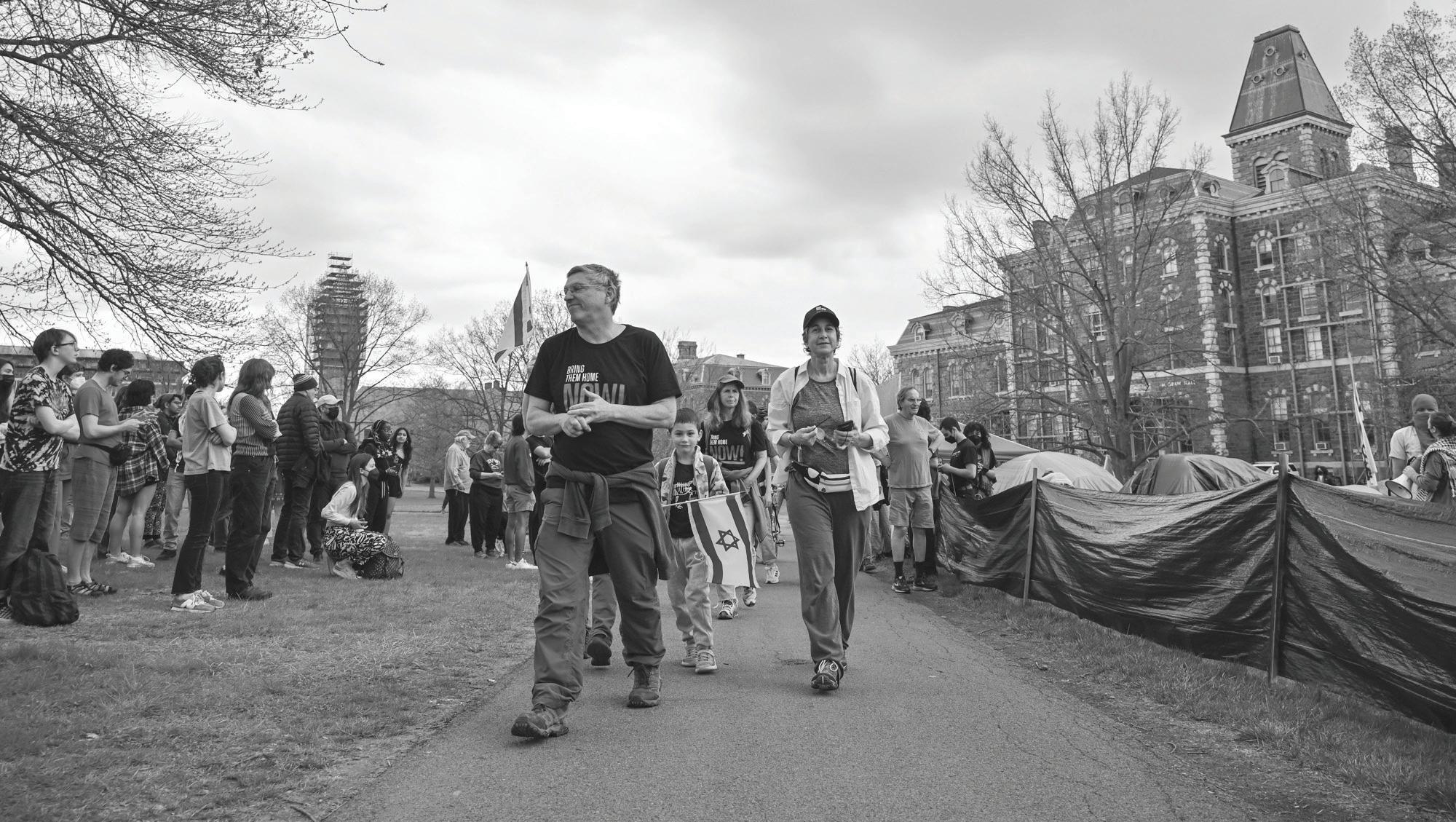
threatening messages were posted by former Cornell student Patrick Dai on Greekrank forums, directly targeting the Jewish community. One post threatened a shooting at 104West!, the location of the Center for Jewish Living and the kosher dining hall. Dai was sentenced to 21 months in prison in August for posting threats to kill or injure another using interstate communications.
Schwartz explained the concerns that Jewish students felt after learning about the threats posted on Greekrank.
“I was scared to walk to class alone,” Schwartz said. “I had to go to class on Monday morning knowing that there was someone out there at our school who believed those things or if they didn’t believe it, at least, believed it enough to put it out there on the internet.”
Benjamin Malekan ’25, co-president of the Center for Jewish Living, explained that following Dai’s threats, many residents became concerned for their safety.
“I was the house manager of the Center for Jewish Living [at the time] and a lot of the residents were very concerned about their safety, whether or not they should be able to sleep in the house,” Malekan said. “A bunch of residents actually moved during those few nights — they slept at friends’ houses in different areas in Ithaca.”
Following the threats, Gov. Kathy Hochul (D-N.Y.) met with students and members of the CJL. Second Gentleman Doug Emhoff also talked with Jewish student leaders to discuss campus antisemitism.
Galperin, who currently serves as the house manager for the CJL, explained how seeing Hochul made the Jewish community feel supported on campus.
“It was really touching to see the state come to our aid so rapidly,” Galperin said. “The governor of New York is a busy person and within something like 12 hours she was in our living room, reassuring us that no harm would come to us.”
Malekan reflected that despite the concern from residents, the support from those in and out of the Cornell community meant a lot in helping students.
Continued from page 1 Matthew Kiviat can be reached at mkiviat@cornellsun.com.
“I think the most beautiful thing is that we had so much support from not just national leadership but had parents of Cornell students, alumni people who we never even met before sending us food, mak-
ing sure we were safe, sending us gift cards, both Jewish and non-Jewish, Malekan said.
Another important campus event was the creation of a pro-Palestinian encampment on campus on April 25, where until May 15, students took over a section of the Arts Quad and erected tents. Cornell encampment was established following the creation of “liberated zones” by pro-Palestinian activists on other college campuses.
Malekan explained that he believes the administration did not adequately enforce its policies when considering the impact of the encampment on Jewish students.
“The encampment represents a complete failure on Cornell’s part to enforce their own policies,” Malekan said. “It’s very difficult for a lot of your students to have to walk past those things every day when they go to class — I think if Cornell is going to make policies, they should be able to enforce them, and not hold double standards allowing them in some places [rather] than others.”
Shapira further highlighted how the encampment showcases the need for the administration to better enforce its rules and ensure that opinions are expressed in a way that aligns with University policy.
Shapira said that although he feels safe on campus, protests and events like the encampment could concern Jewish students due to the language used by protesters.
“I just feel it’s just not really in my nature to, almost to succumb to the feelings of fear,” Shapira said. “But I can totally understand students feeling unsafe — I mean, when there are calls for intifada on campus and people all masked up so that nobody knows who they are it is very reasonable to feel unsafe and experience those emotions and that feeling because at the end of the day, Intifada is a chant that’s the calling to murder Jews.”
The word “intifada” translates to “to shake off” in Arabic. The word intifada is often associated with two Palestinian uprisings, periods of violence and bloodshed in Israel and the Palestinian territories.
To continue reading, please visit www. cornellsun.com.
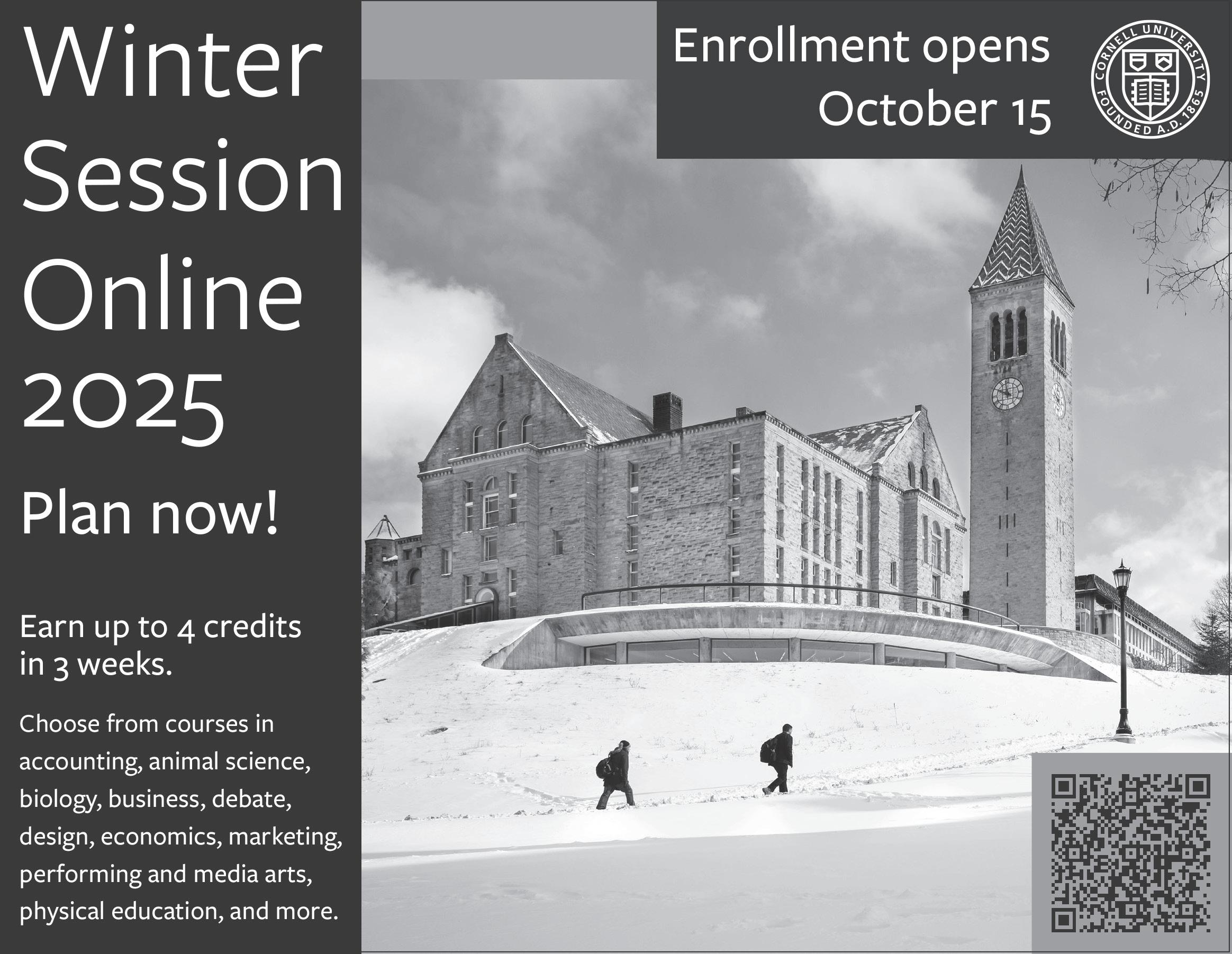

By
Oct. 6 — Ithacans enjoyed a lively celebration of Hispanic and Latino culture with diverse cuisines, live performances and artisan booths at the Third Annual Heritage Fiesta at Press Bay Alley on Saturday.
Organized by the Latino Civic Association of Tompkins County, the festival also featured booths run by nonprofit organizations supporting immigrant communities in Ithaca and the larger Tompkins County.
Maia Consolo, a volunteer for LCAT, highlighted the organization’s efforts to strengthen connections between immigrants with various community events.
“[The LCAT] does a lot of annual events like this one to build community,” Consolo said. “[For immigrants,] finding community is so important.”
One of the booths at the festival was No Mas Lagrimas/No More Tears, a nonprofit organization that supports individuals from all backgrounds and identities affected by socioeconomic barriers. Ana Ortiz explained that the organization distributes food every Thursday from 4 p.m. to 6 p.m. at Henry St. John Building to anyone in need.
Ortiz attributed the increase in immigration that she sees in Ithaca to the diverse and welcoming nature of the city.
“I see more Latino and people from different countries than ever before, because Ithaca is a place [where] people don’t even care where you’re coming from,” Ortiz said. “Cornell and Ithaca College have people from everywhere in the world, so I think [immigrants] feel comfortable.”
Gudelia Nava, who works at the Midstate Council for Occupational Safety and Health, explained how her organization supports essential workers in New York Finger Lakes and Southern Tier regions.
“We help the people and farm workers in Tompkins County and [other counties],” Nava said. “[We] give information for sexual harassment, and do the training for health and safety and if they have [any] problems we try [to] help.”
MCOSH also engages in advocacy work by organizing
essential migrant farm and restaurant workers and providing services to immigrant populations.
Nava discussed challenges immigrants face when settling in that can hinder their ability to integrate into a new environment.
“Sometimes [they] speak [little] English. This is a problem for them. And sometimes there isn’t a good salary. This [can be] scary for the immigrant,” Nava said.
Ortiz hopes to engage with the city and Tompkins County to remove the language barrier for immigrants in Ithaca.
“Right now, I am trying to [talk to] the city and the
hospitals and start bringing information in different languages, starting [with] Spanish,” Ortiz said.
Ortiz, who is from Puerto Rico, reflected on how her drive to inspire and empower others was recently recognized through the Tompkins Weekly Hometown Hero distinction.
“That has never happened before in the history of Ithaca — a Latina, a woman [becoming the] Hometown Hero in Tompkins County,” Ortiz said. “So I want to use my award to [raise] awareness, to say, ‘If I can do it, anybody can do it.’”
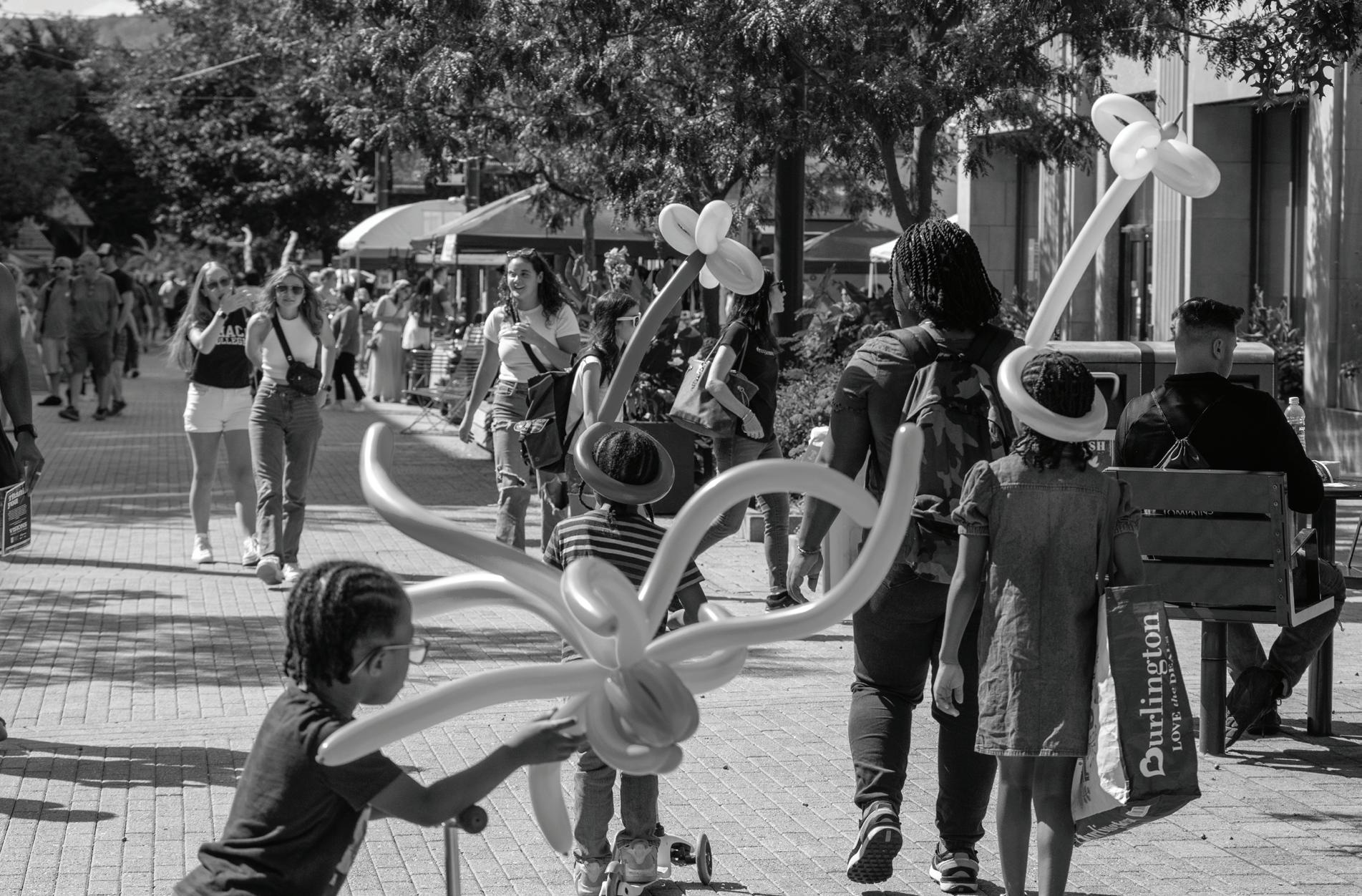
Oct. 4 — Sunflower House — a program providing affordable, transitional housing for formerly incarcerated individuals — was granted 45,000 dollars per year for three years from the Tompkins County budget at the legislature’s Thursday meeting, despite receiving initial recommendations denying further funding.
Sunflower House offers services for formerly incarcerated or court-involved men including case management services for addiction and mental health challenges, medical needs, transportation and employment services.
The project is a collaboration between Ultimate Reentry Opportunity, Ithaca Neighborhood Housing Services and Opportunities, Alternatives and Resources.
For the past three years, the Tompkins County Legislature has provided funding for the Sunflower Houses as part of a three-year pilot program. This year, the organizations requested a follow-up one-time request of $77,680 to pay for the salary and benefits for a full-time housing manager, cleaning and maintenance costs and support for vacancies.
County Administrator Lisa Holmes recommended that the funding should not be granted this fiscal year in her suggested Tompkins County Budget while the county experiences a five percent budget cut.
In response to the recommendation, local advocates rallied outside the Tompkins County Legislature Chambers on Sept. 30 to advocate for the Sunflower Houses. Additionally, advocates sent emails to legislators, as obtained by The Sun, which contained an assessment report outlining the benefits of the Sunflower Houses, including a 61 percent decrease in homelessness among program members and a low in-program recidivism rate.
“If you’re serious about not wanting to be homeless, [the Sunflower Houses give you] privacy, respectability, security [and] humanity,” said Legislator Veronica Pillar (2nd District) during the budget presentation. “So, I think it would be good for us to have this program continue and not see a lapse.”
To continue reading this article, please visit www.cornellsun.com.
can be reached at dfrancemiller@cornellsun.com.
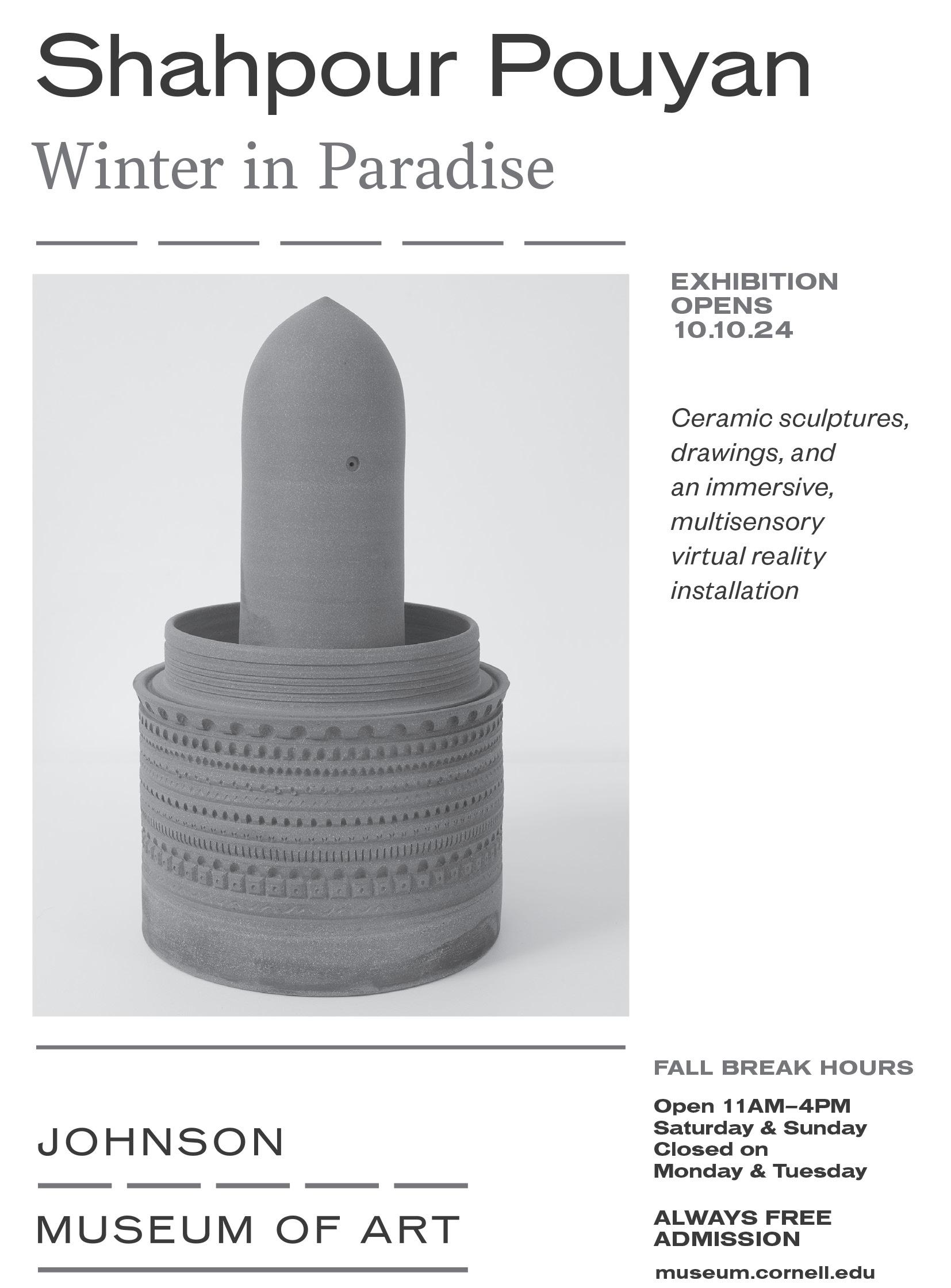
VARSHA
On Friday, I walked into CAP ArtSpace and was immediately struck by radiant lines of orange, magenta and teal. Lauren Reid’s oil painting, “Interconnected,” hung directly ahead of the gallery’s entryway. Her canvas depicted a striking collage of neon faces and bodies, making it difficult to focus on each part of the piece, yet still captivating.
“I love colors,” Reid said. “[This piece] really captures what my art’s about. It shows that I’m influenced by everything that I am part of. It means everything to me.”
The exhibit at CAP ArtSpace, an art gallery in Ithaca Commons, served as a kick-off event for the Greater Ithaca Art Trail, a community of over 50 artists from Tompkins County. The Art Trail planned their season kick-off during Ithaca Gallery Night, a monthly event where galleries around Tompkins County open their venues to local artists. 40 artists from the Art Trail shared samples of their art for this exhibit. Around the room, I watched as people of all ages observed paintings, etchings, photography and more. Speaking to some of these gallery-goers, they said that many Ithaca locals use Ithaca Gallery Night as a way to go out with their loved ones and see great art.
Artist Cai Quirk appreciated the crowd that Ithaca Gallery Night brought to the exhibit, and said that the opportunity to share their art was meaningful. Throughout the event, I saw them speak passionately to people about their art and the
“Hot
ASHLEYROSE
If you’re new to Cornell and looking for more on-campus bands to listen to, you may have heard of After Six, a band made of Cornell undergraduate students. After Six, who opened for Slope Day 2023, mixes jazz, pop, R&B and neo-soul to adhere not only to each member’s own taste in music, but also to make their art very open to anyone and everyone despite what your favorite music genre might be. They recently released a new single called “Hot Glue,” a song that won’t just have you turning your volume up to dance around the room while your roommate is out, but might also have you thinking about that certain someone that makes your heart pound every time you see them. Compared to their other single, “A6 Funk,” which plays more with a hip-hop, streetstyle sound, “Hot Glue” brings along a jazzy bass line, a brass section spotlight and riffs to die for. The song opens with a slow piano introduction and some beautiful riffs, which then lead to bits of bass, drum and harmonization from vocalists Noëlle Romero ’24, Summer Seward ’25, and Austin Burgett ’25. The piano keeps a primary melodic motif, this being the descending three notes we hear repeated in the verse. It’s the kind of melody that tickles my brain just right with the way the top notes linger and are subtle enough to be heard yet don’t overtake the other instruments. The song revolves around the love of the narrator towards their partner, and how they want to be together as if “stuck by glue,” hence, the title of the song. The brass and percussion sections contribute a very jazzy, yet also poppy, feel that I can’t help but bop my head to. The saxophone solo ad libs by Josh Sokol ’25 provides one of the primary sources of jazz in this song, giving the background more depth romantically and instrumentally as the vocals and piano hold the melody steady. The bass and drums playfully interact with each other throughout the song, taking charge of the tempo while creating a fun, flirty kind of feel underneath the melody as they interweave. The division of lines given to each of the soloists in this arrangement gives equal parts to each of them and showcases their vocal strengths wonderfully, like Burgett’s incredible
messages they hoped to convey.
“In making work around queerness and celebrating queerness, it’s important to me that a variety of people get to see [my art] — more than just people who are already supportive or already who are queer,” Quirk said. “Group shows are a place to help people who might be growing in their support of queerness expand even further.”
Quirk shared a digital print on fabric titled “Jesse Prayer Hands,” which they hoped audiences would be drawn to and would serve as a good “entry point” to some of their other work. The piece pictures an intricate mosaic, reminiscent of stained glass, illustrating a person closing their eyes and clasping their hands together as if in prayer. The piece felt larger than life in that I felt I could never fully explore its every meaning.
On the other side of the room, Jennifer Byrd Rubacky’s photograph of Cascadilla Gorge Trail reminded viewers of what lay beyond the walls of CAP ArtSpace’s gallery. Her photograph seemed straightforward, but I could feel a resonant importance behind its simplicity.
Rubacky’s husband, Chris Rubacky, attended the event and marveled at the variety of art pieces displayed in the exhibit. He seemed genuinely happy to be surrounded by artists and art-lovers. While he said he loved that people enjoyed his wife’s photograph, what he loved even more was being able to see everyone enjoying all of the different types of art. “It’s all too cool,” Chris Rubacky said. “If I had the budget, I’d buy $5,000 worth [of the artwork here].”
Robin Schwartz, program director for the
Community Art Partnership of Tompkins County, headed the event. Schwartz said her job holds the same feeling of enveloping camaraderie as “hanging out in the band room” in high school — I could see the energy she was referencing as she waved “Hellos” and it seemed as though everyone in the room knew her name. She smiled warmly while introducing artists and was eager to show off the variety of local artwork around the room.
“Performing artists, like musicians, have a network and they’re invited to perform. But visual artists and writers generally work in isolation,” Schwartz said. “It’s important for artists to be able to show their work and it’s important for the people in the community to have a place to go see that.”
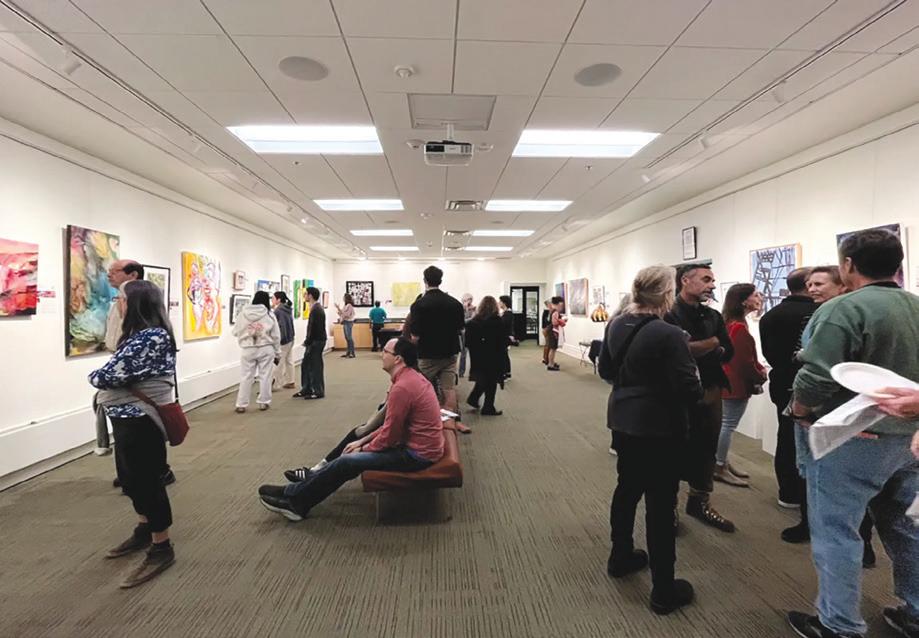
range along with Seward and Romero’s crisp riffs. It is a duet, which I think makes the song’s message even more powerful: When two people are in love, it’s like being completely in tune with each other. The song stays upbeat and funky until the end when things slow down and it is only the piano and the soloists once again. The cyclic arrangement, both beginning and ending with just piano and vocals, lends a perfect simplicity, while allowing the middle to explode with the constant joy of love. If you are into something groovy that will get you up and dancing but also might make you swing your feet and giggle about that one person, I fully recommend listening to “Hot Glue” (especially as the fall “cuffing” season approaches). The lyrics give such a raw, pure expression of that feeling of having a crush on someone. I got the chance to ask After Six member Noëlle Romero ’24 a bit more about this song, After Six’s creative process and the future. For clarity and style, this interview below was slightly edited.
The Sun: “What was the process of writing and producing this new single like?”
Romero: “In After Six, we approach songwriting in a few ways. One of our graduated members, Luke Ellis, was able to craft music on his own, providing charts for each instrument in the band. For example, our first single this semester ‘Hot Glue’ was entirely his work. When writing it, he was able to create a music piece that expressed both his style and the After Six vibe. However, we also have a few songs that take on a more collaborative approach. Often, different sections of the group will write their own parts for a given song. Our upcoming single ‘Growing Up’ was written by the vocalists of the group, but Josh Sokol ’25, the saxophonist, was able to write his solo in the way that he envisioned. In this band, we want every person to shine and be a part of the creativity, so whether that is bringing a music piece of your own or partnering up with another person, we will be more than happy to produce and support the music we each provide.”
The Sun: “What did you guys have in mind for the single? What did you want it to sound like and what did you not want it to sound like?”
Romero: “For all of our singles, there isn’t necessarily a mechanic that we follow of what the songs should and shouldn’t sound like, i.e. replicating the sound of
another artist. It’s more based on what the group’s vibe is at the time or what we want the message of the song to reflect. In Hot Glue, we want the listener to feel the joy and infectious emotion of having a crush. We hope that the listener can experience what we sing about by listening to the song. Similarly, in ‘Growing Up,’ the musicality reflects the message of the song – it has a steady pace until it ends and flows, showing the ups and downs of life during these very formative years at college.”
The Sun: “What are you planning for the future?”
Romero: “We are quite excited this semester, as we have a few projects in store. Most things are still underway, but you can definitely catch us promoting our new singles throughout the semester. We have a few releases planned – including music that we have never performed live!”
The Sun: “Are you guys excited for your November 9th concert at Deep Dive?”
Romero: After Six is incredibly excited for our Deep Dive performance on November 9th, especially because we have two [new] members this semester: Theo Lobo ‘27 and Eva Veciana ‘27. We look forward to having our first live performance with them and seeing their immense talent shine onstage! We also cannot wait to reconnect with the Ithaca music community. Performing live is our passion, and it means the world that we get the opportunity to do so.
Last but not least, new members Theo and Eva gave the Sun this quote for their November 9th concert: Lobo, Veciana: “I am so excited to perform with After Six for the first time on November 9th! From just a few rehearsals, I know playing live with this group is going to be so much fun. The energy on stage is gonna be lit.”
Not only should you listen to “Hot Glue”, but also go see them down at Deep Dive on Nov. 9, 2024! Deep Dive is a great spot to find local artists, and it’s a beautiful spot to listen to music as it is right by the water. Stream After Six, become their biggest fans, go to Deep Dive on November 9th and support local music at Cornell.
Ashleyrose Saffie is a junior in the College of Arts & Sciences. She can be reached at as3787@cornell.edu.
By CAROLINE MICHAILOFF Sun Senior Writer
Oct. 7 — George and Milany Papachryssanthou, the couple behind beloved local establishments like Chatty Cathy, Ithaca Wine and Spirits and Souvlaki House, have taken their reputation to new heights with the recent relocation of their popular Neapolitan pizza spot, Thompson and Bleeker.
George grew up in Ithaca, where his parents owned and ran the Souvlaki House, located on Eddy Street. Souvlaki House has been a steady fixture in the Ithaca culinary scene, remaining open for more than 50 years as other restaurants come and go.
Though George never intended to pursue a career in the restaurant industry after graduating from the University of Vermont, he moved to New York City to work for a large hospitality group for six years. During his time in New York City, he met his wife Milany while working at the same restaurant. The couple moved to Ithaca in 2015, seeing it as a better place to raise a family.
“We saw a need for several things in Ithaca, things that were more health-driven [and] tastier … and George has a background in hospitality. His parents owned The Souvlaki house, so at a very young age, he was working in the kitchen,” Milany said.
The couple first decided to open up Ithaca Wine and Spirits, as they saw a need for an upscale liquor store with organic wines.
“From there, we opened up Chatty Cathy, which we saw a need for a gourmet coffee shop with more health-driven food options,” Milany said.
Then came Thompson and Bleeker, which was intended to be a restaurant with healthier pizza and pasta options.
“We create concepts that we would ourselves frequent,” George said. “We are trying to take the thought process out of eating healthy.”
George and Milany have welcomed two children into their family in recent years, a five-month-old and a three-year-old, so balancing their five businesses can be difficult to manage at times. However, they credit much of their success to their staff.
“We’re surrounded by really talented, kind, smart people who are really good hospitality operators, and without them, we couldn’t do what we do,” George said.
One of the biggest challenges the couple has faced during their careers was COVID-19, as it hit within the second year of Thompson and Bleeker’s opening. According to CNBC, about 60 percent of restaurants fail in their first year of operation, and 80 percent fail within five years of opening.
“We were doing like 200 pizzas a night [takeout orders], every night, in four hours. It was just madness,” George said. “Thankfully, it was that, as opposed to us sitting in there thinking about how we were going to pay rent or our mortgage or other expenses.”
Now situated in the Barr Building on East Seneca Street in the Ithaca Commons, Thompson and Bleeker has doubled its seating capacity, transforming from a cozy 38-seat restaurant to a spacious venue accommodating 72 guests.
“The building itself is beautiful,” George said. “We needed a larger area to accommodate our guests and improve our kitchen efficiency, which allows us to create a more comfortable dining experience.”
Since opening their original location in 2018, Thompson and Bleeker quickly became a favorite among locals, often facing wait times of up to three hours. After purchasing the Barr Building a year and a half ago, the couple strategically planned for this expansion, reopening on July 19 with exciting new features, including a full liquor bar.
Thompson and Bleeker will be the Papachryssanthou couple’s last full-service restaurant. Their goal in the next few years is to start a chain called Fresh Marche, a Parisian-style salad bar and Italian-inspired sub sandwiches concept. Fresh Marche’s first spot is set to open in the next couple of months where Thompson and Bleeker was previously located on 220 East State Street.
Fresh Marche will open its second location in Spring 2025 on College Avenue in the Catherine Commons.
“We’re younger than a lot of the people that are in similar businesses that we are, so I think we have sort of a refreshed idea on what younger people enjoy,” George said. “It all comes back to when you open a business, you obviously feel there’s a void for it.”

“The events of the last two days mean nothing could be the same,” one of the masked protest speakers said. “I see my community mobilized the way I never could have imagined. Now we can’t go back.”
Just one day before Malina’s comment was reported by The Sun, BSU leadership met with Interim
President Michael Kotlikoff and Vice President of Student and Campus Life Ryan Lombardi regarding concerns for student safety following the suspension of international graduate student Momodou Taal over his involvement in a career fair disruption.
If Taal is withdrawn from the University, he will be in violation of his F-1 visa status, likely leading to his deportation.
Nearly 20 other pro-Palestinian protesters who helped shut down the career fair — which
was attended by defense contractors Boeing and L3Harris — have been identified through video and photographic evidence and have been referred for disciplinary action, according to a Monday afternoon email from Kotlikoff to the Cornell community.
Kotlikoff wrote that protesters were explicitly told that they were not permitted to enter Statler Hotel by Cornell University Police Department officers. They pushed through police at the ground-floor and second-floor entrances, according to Kotlikoff. Sun reporters at the career fair did not witness violence against law enforcement.
“This past year, we have seen which lives Cornell values over others,” one of the masked protest speakers said, “They don’t look like you and me.”
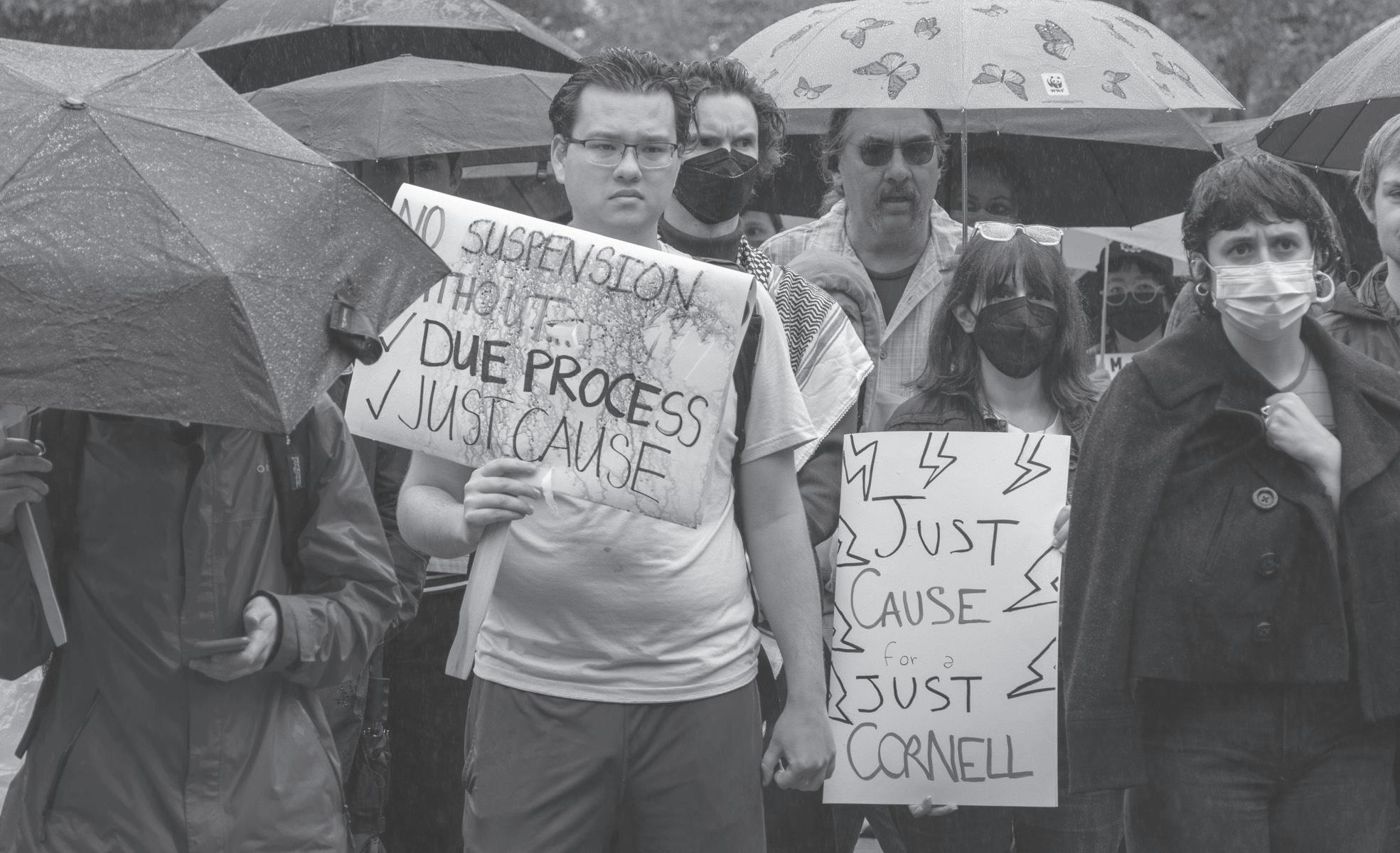
matters to us because every worker should be entitled to due process and just cause protections —- you are not alone here.”
A masked speaker delivered a speech written by Taal, who is currently barred from campus due to his suspension. Taal’s speech alleged that the University was infringing on his freedom of speech rights.
“My actions fell squarely within the ground of free speech and people protest. I have not engaged in any form of violence, nor have I called for such action,” the speaker read from Taal’s speech. “Instead, my advocacy has been rooted in the principles of social justice and equality, principles that are fundamental to the Africana studies.”
At around 12:35 p.m., protesters marched from Bailey Hall to Day Hall to continue demonstrating.
The CGSU rally parades from Bailey Hall to Day Hall. (Ming DeMers/Sun Photography Editor)
Outside Day Hall, Alderperson Kayla Matos (D-First Ward) addressed the crowd supporting Taal.
Matos is an advocate for just cause legislation — an effort to end employment at will practices in Ithaca. Employment at will laws allow for employers to fire employees without any notice or reasoning. She said graduate students should be included in just cause legislation, which would only allow employers to fire workers without notice for “egregious misconduct.”
“What you are fighting for is something that matters to your elected officials and the entire Ithaca community,” Matos said. “It
Prof. Risa Lieberwitz, industrial and labor relations, the president of the Cornell University Chapter of the American Association of University Professors, said the organization stood in solidarity with CGSU and asked the
“My advocacy has been rooted in the principles of social justice and equality.”
Ph.D. student Momodou
University to bargain with the union.
“We must have each other’s backs, we must be in alliance collectively, we must be in alliance individually, we must come together,” Lieberwitz said. “We are against the infringement on our academic freedom and our freedom of speech.”
A University spokesperson sent a statement claiming that the administration has cooperated with the Union over the course of the past few months.
“Cornell University and the CGSU-UE have met regularly since April to negotiate a first collective bargaining agreement. Bargaining sessions have been productive and led to tentative agreements on several articles,” the statement read. “Cornell continues to negotiate in good faith to ensure a contract that supports the needs of graduate workers.”
By ANIKA KOLANU Sun Staff Writer
On a sunny Saturday afternoon in Ithaca, football (1-2, 1-1 Ivy) got set to host the University at Albany (2-3, 0-1 CAA). After a more-than-successful homecoming weekend, the Red looked forward to adding to its win record; however, the Danes had other plans.
After competing with UAlbany for three quarters, Cornell surrendered two late touchdowns in a 31-10 loss.


UAlbany opened the scoring with a field goal after a rushing drive that the Red’s defense halted at the 20-yard line. After getting possession, the Red was quickly forced to punt following a false start. UAlbany’s offense then controlled the remainder of the first quarter, which ended with a missed field goal attempt. In the second quarter, senior

quarterback Jameson Wang was able to connect with junior wide receiver Parker Woodring to put Cornell up 7-3. UAlbany tried to respond, but big stops initiated by sophomore cornerback Braylon Howard, senior cornerback Michael O’Keefe and senior linemen Hunter Sloane, Maxwell Van Fleet and fifthyear Brendan Chesnut quickly ended UAlbany’s efforts.
The Red started the second half with possession, but consecutive false starts — a
somewhat common miscue on Saturday — again led to a quick punt. UAlbany capitalized with its first touchdown on a firstand-ten play, as quarterback Myles Burkett connected with Jacari Carter, giving the Danes a three-point lead.
Sophomore kicker Alan Zhao then nailed a 35-yard field goal to close out the quarter, but UAlbany’s kicker John Opalko matched it with one of his own, growing the lead to six points. UAlbany held a 16-10 advan-
tage heading into the final quarter.
UAlbany found its momentum in the fourth quarter, building a lead that the Red couldn’t overcome. Jojo Uga was the first to reach the end zone with a 16-yard rush, followed by running back Faysal Aden’s game-clinching 84-yard rush, sealing the victory for UAlbany.
While passing yards were nearly identical between the two quarterbacks — 225 for Burkett and 213 for Wang — the real difference came in the rushing game. Cornell managed only 97 yards on the ground compared to UAlbany’s 273.
Head coach Dan Swanstrom had emphasized ahead of the matchup that “every yard [was] going to be earned” against the Danes’ defense, and they certainly delivered on that expectation.
The Red will conclude its three-week homestand by taking on Harvard this Friday. Kickoff is set for 6 p.m. at Schoellkopf Field, and coverage will be on ESPN2.
Anika Kolanu can be reached at akolanu@cornellsun.com.

